
199+ Physical Science Research Topics [Updated 2024]
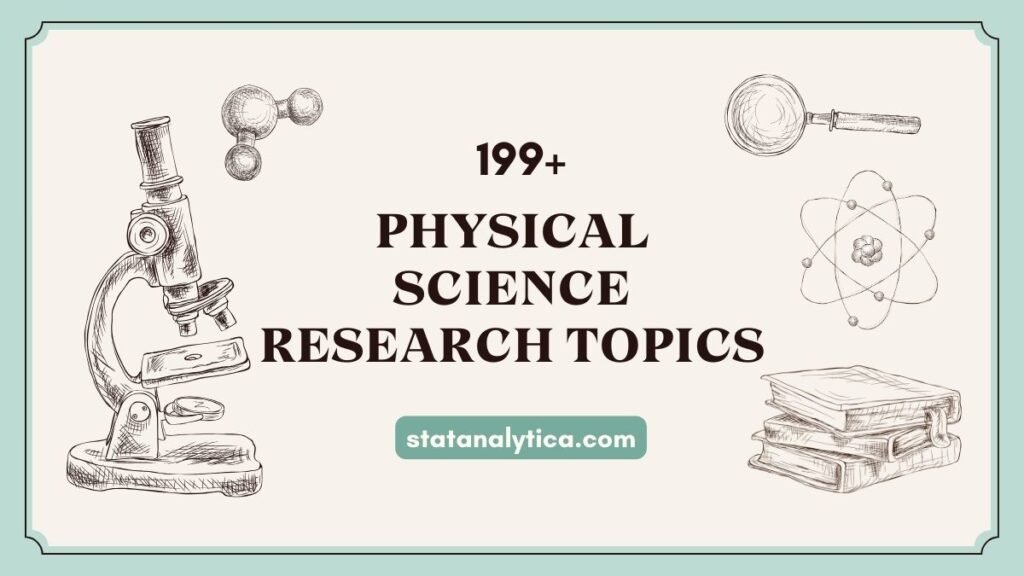
Physical science, a branch of natural science, delves into the fundamental principles that govern the physical world around us. From the microscopic world of atoms and molecules to the vast expanse of the cosmos, physical science encompasses a wide array of phenomena. In this blog, we will embark on a journey through the realms of physical science research topics, exploring captivating topics that continue to push the boundaries of human knowledge.
Top Reasons To Study Physical Science Research Topics
Table of Contents
- Foundation of Scientific Understanding: Studying physical science research topics provides a foundational understanding of the fundamental principles that govern the natural world. This knowledge serves as the basis for advancements in various scientific disciplines.
- Innovation and Technological Advancements: Research in physical science drives innovation and leads to technological breakthroughs. From the development of new materials to cutting-edge technologies, the insights gained contribute to the advancement of human civilization.
- Solving Real-World Problems: Physical science research addresses real-world challenges, such as climate change, pollution, and energy sustainability. By understanding the underlying physical processes, researchers can develop solutions to mitigate environmental issues and improve quality of life.
- Interdisciplinary Applications: Physical science is inherently interdisciplinary, fostering collaboration between different scientific fields. This cross-disciplinary approach allows researchers to tackle complex problems that require expertise from physics, chemistry, biology, and engineering.
- Space Exploration and Astrophysics: Physical science plays a crucial role in space exploration. Studying astrophysics, for example, enables us to comprehend the universe’s origins, explore other planets, and understand the conditions necessary for life beyond Earth.
- Medical Advancements: Physical science research contributes significantly to medical advancements. Techniques like imaging technologies, materials science applications in medical devices, and understanding the physics of biological processes drive progress in healthcare.
- Technological Tools and Instrumentation: Advances in physical science research lead to the development of sophisticated tools and instruments. These tools, ranging from high-resolution imaging devices to powerful particle detectors, enhance our ability to observe, measure, and understand the physical world.
- Environmental Stewardship: Research in physical science informs strategies for environmental conservation and sustainable development. By studying Earth’s systems, researchers can propose solutions for mitigating the impact of human activities on the environment.
- Career Opportunities and Skill Development: A background in physical science opens up diverse career opportunities. Whether in academia, industry, or research institutions, individuals with expertise in physical science are well-equipped with analytical and problem-solving skills sought after in various professional settings.
- Contributions to Fundamental Knowledge: Engaging in physical science research contributes to the expansion of humanity’s fundamental knowledge. Through curiosity-driven exploration, researchers uncover new phenomena, deepen our understanding of the universe, and pave the way for future discoveries that can shape the course of scientific inquiry.
199+ Physical Science Research Topics: Category Wise
Physics research topics, classical mechanics.
- Analysis of chaotic behavior in classical mechanical systems.
- Application of classical mechanics in engineering design.
- Investigation of non-linear dynamics in classical systems.
Quantum Mechanics
- Quantum teleportation and its implications for communication.
- Development of quantum algorithms for solving complex problems.
- Quantum information processing and its potential impact on cryptography.
Astrophysics
- Exploration of exoplanets and their potential habitability.
- Understanding the dynamics of galactic collisions.
- Study of the cosmic microwave background radiation for insights into the early universe.
Nuclear Physics
- Investigation of nuclear fusion as a sustainable energy source.
- Study of exotic nuclei and their properties.
- Applications of nuclear physics in medical imaging and treatment.
Condensed Matter Physics
- Research on topological insulators and their unique properties.
- Development of new materials with superconducting properties.
- Study of quantum phase transitions in condensed matter systems.
Chemistry Research Topics
Organic chemistry.
- Development of new methods for asymmetric synthesis.
- Investigation of the chemistry of natural products for drug discovery.
- Design and synthesis of organic photovoltaic materials.
Inorganic Chemistry
- Study of catalytic processes using transition metal complexes.
- Exploration of metal-organic frameworks for gas storage and separation.
- Bioinorganic chemistry and its role in biological systems.
Physical Chemistry
- Development of advanced spectroscopic techniques for molecular analysis.
- Study of chemical kinetics and reaction mechanisms.
- Computational chemistry for predicting molecular properties.
Earth Science Research Topics
- Seismic imaging of Earth’s interior and its implications for tectonic processes.
- Investigation of magnetic anomalies in the Earth’s crust.
- Understanding the dynamics of earthquakes and their prediction.
Meteorology
- Climate modeling and the impact of human activities on global climate.
- Research on extreme weather events and their causes.
- Study of atmospheric aerosols and their effects on weather patterns.
Oceanography
- Exploration of deep-sea ecosystems and biodiversity.
- Investigation of ocean acidification and its impact on marine life.
- Analysis of ocean currents and their role in climate regulation.
Materials Science Research Topics
- Nanotechnology applications in medicine for targeted drug delivery.
- Development of flexible and transparent electronics.
- Study of self-healing materials for enhanced durability.
Biomaterials
- Design of biocompatible materials for medical implants.
- Investigation of biomimetic materials inspired by natural structures.
- Development of smart materials with responsive properties.
Solid-State Physics
- Exploration of novel electronic and magnetic properties in solid-state materials.
- Study of quantum dots and their applications in optoelectronics.
- Investigation of topological insulators for quantum computing.
Environmental Science Research Topics
Pollution control.
- Development of advanced technologies for air pollution control.
- Remediation of contaminated water using nanomaterials.
- Monitoring and mitigation of soil pollution.
Renewable Energy
- Advancements in solar cell technology for efficient energy conversion.
- Research on next-generation batteries for energy storage.
- Harnessing energy from ocean currents and waves.
Sustainable Development
- Assessment of the environmental impact of urbanization.
- Sustainable agriculture practices for food security.
- Integration of renewable energy sources into smart grids.
Interdisciplinary Research Topics
Scientific instrumentation.
- Development of high-resolution electron microscopes for nanoscale imaging.
- Advancements in X-ray crystallography for structural analysis.
- Miniaturization of scientific instruments for space exploration.
Artificial Intelligence in Scientific Research
- Machine learning applications in predicting chemical reactions.
- Optimization of experimental designs using AI algorithms.
- Automated analysis of astronomical data for celestial object discovery.
Cross-disciplinary Collaborations
- Collaboration between physicists and biologists for cancer research.
- Integration of materials science and engineering for novel device fabrication.
- Joint efforts in climate science involving meteorologists and geophysicists.
Emerging Trends in Physical Science Research
Quantum computing.
- Development of quantum algorithms for optimization problems.
- Quantum machine learning for data analysis.
- Error correction techniques in quantum computing.
Advanced Imaging Techniques
- Super-resolution imaging for studying cellular structures.
- Development of in vivo imaging techniques for medical diagnostics.
- Imaging the dynamics of chemical reactions at the atomic scale.
High-Energy Particle Detectors
- Search for new particles beyond the Standard Model of particle physics.
- Application of particle detectors in medical imaging.
- Development of lightweight and portable particle detectors for space exploration.
Mass Spectrometry
- Advances in mass spectrometry for proteomics and metabolomics.
- Imaging mass spectrometry for spatial mapping of biomolecules.
- Integration of mass spectrometry with other analytical techniques for comprehensive analysis.
Miscellaneous Physical Science Research Topics
- The role of dark matter in the evolution of the universe.
- Investigation of the Higgs boson and its implications for particle physics.
- Research on the formation and dynamics of planetary rings.
- Theoretical modeling of the behavior of plasmas in fusion reactors.
- Study of magnetic reconnection in astrophysical and laboratory plasmas.
- Application of lasers in precision measurements and quantum optics.
- Analysis of the impact of space weather on Earth’s magnetosphere.
- Development of space-based telescopes for astronomy and astrophysics.
- Investigation of gravitational waves and their sources in the universe.
- Research on the effects of microgravity on biological organisms.
- Development of regenerative medicine techniques in space environments.
- Study of the long-term effects of space travel on the human body.
- Exploration of the interactions between light and matter in quantum optics.
- Application of quantum dots in advanced display technologies.
- Investigation of quantum coherence and entanglement in complex systems.
- Development of environmentally friendly and sustainable packaging materials.
- Study of the properties and applications of metamaterials.
- Exploration of the physics of soft matter and complex fluids.
- Research on the dynamics of wildfires and their ecological impact.
- Investigation of the role of aerosols in climate change.
- Analysis of the influence of land-use changes on local and regional climates.
- Development of advanced sensors for environmental monitoring.
- Study of the impact of ocean circulation on marine ecosystems.
- Exploration of the microbial diversity in extreme environments.
- Application of virtual reality in simulating complex physical systems.
- Research on the use of augmented reality in education and training.
- Development of immersive technologies for scientific visualization.
- Investigation of the role of epigenetics in cellular processes.
- Study of the physics of protein folding and misfolding.
- Application of CRISPR technology in genetic engineering.
- Development of bio-inspired robotics for medical applications.
- Exploration of swarm intelligence and collective behavior in robotics.
- Study of the biomechanics of human movement and sports.
- Research on the physics of musical instruments and acoustics.
- Development of innovative musical interfaces and technologies.
- Exploration of the psychological and physiological effects of music.
- Investigation of the physics of fluid dynamics in aviation.
- Study of the aerodynamics of unconventional aircraft designs.
- Application of advanced materials in aerospace engineering.
- Development of advanced imaging techniques for medical diagnostics.
- Study of the physics of medical ultrasound and its applications.
- Exploration of novel therapies in medical physics.
- Research on the physics of magnetic resonance imaging (MRI).
- Investigation of new contrast agents for medical imaging.
- Development of portable and low-cost medical imaging technologies.
- Study of the physics of phase transitions in materials.
- Exploration of the properties and applications of 2D materials.
- Application of materials science in the design of energy-efficient buildings.
- Investigation of the physics of earthquakes and fault mechanics.
- Research on the monitoring and prediction of volcanic eruptions.
- Exploration of the physics of landslides and slope stability.
- Study of the physics of the human eye and vision.
- Development of advanced ophthalmic imaging technologies.
- Exploration of the role of optics in virtual and augmented reality.
- Development of quantum sensors for precision measurements.
- Study of the quantum properties of light and its applications in communication.
- Investigation of the physics of magnetic materials and spintronics.
- Exploration of the quantum behavior of electrons in nanoscale systems.
- Development of quantum information processing using solid-state devices.
- Study of the physics of fluid dynamics in microscale systems.
- Exploration of the behavior of fluids in confined geometries.
- Application of microfluidics in biotechnology and medical diagnostics.
- Investigation of the physics of superconductivity and its applications.
- Research on high-temperature superconductors for practical applications.
- Exploration of unconventional superconducting materials.
- Development of advanced techniques for 3D printing of materials.
- Study of the physics of additive manufacturing processes.
- Exploration of novel materials for 3D printing applications.
- Investigation of the physics of atmospheric chemistry.
- Research on the interactions between pollutants and atmospheric components.
- Exploration of strategies for air quality improvement.
- Study of the physics of laser-induced plasma and its applications.
- Development of laser-based technologies for material processing.
- Exploration of the physics of laser-matter interactions in extreme conditions.
- Application of artificial intelligence in predicting and controlling epidemics.
- Development of AI algorithms for drug discovery and personalized medicine.
- Exploration of the ethical implications of AI in healthcare.
- Study of the physics of dark energy and dark matter in the universe.
- Exploration of alternative theories of gravity and their cosmological implications.
- Investigation of the large-scale structure of the universe.
- Research on the physics of quantum communication and cryptography.
- Development of quantum key distribution systems for secure communication.
- Exploration of the fundamental principles of quantum information theory.
- Study of the physics of neutron stars and pulsars.
- Investigation of the astrophysical origin of cosmic rays.
- Exploration of the properties and behavior of black holes.
- Study of the physics of quantum entanglement and its applications.
- Exploration of the quantum nature of time and space.
- Investigation of the physics of complex networks in diverse systems.
- Research on the dynamics of social networks and information spread.
- Exploration of emergent behavior in networked systems.
- Study of the physics of climate change and its impact on ecosystems.
- Development of strategies for climate change mitigation and adaptation.
- Exploration of the role of human activities in altering the Earth’s climate.
- Investigation of the physics of earthquakes and seismic hazards.
- Study of the dynamics of fault systems and earthquake prediction.
- Exploration of the impact of earthquakes on infrastructure and communities.
- Development of advanced techniques for remote sensing of the Earth.
- Study of the physics of satellite-based observation systems.
- Exploration of the role of remote sensing in environmental monitoring.
- Investigation of the physics of turbulence in fluid flows.
- Research on the control and manipulation of turbulent flows.
- Exploration of the applications of turbulence modeling in engineering.
- Study of the physics of neuronal networks and brain dynamics.
- Development of neuroimaging techniques for studying brain function.
- Exploration of the role of neural networks in learning and memory.
- Investigation of the physics of gene expression and regulation.
- Study of the dynamics of cellular processes in living organisms.
- Exploration of the physics of genetic mutations and their consequences.
- Development of advanced imaging techniques for studying cellular structures.
- Study of the physics of cellular transport and trafficking.
- Exploration of the role of physical forces in cellular processes.
- Investigation of the physics of protein folding and misfolding.
- Research on the dynamics of protein-protein interactions.
- Exploration of the role of physical forces in protein function.
- Study of the physics of fluid dynamics in biological systems.
- Development of computational models for simulating biological fluid flows.
- Exploration of the biomechanics of tissues and organs.
- Investigation of the physics of ecological systems and biodiversity.
- Study of the dynamics of ecosystems in response to environmental changes.
- Exploration of the physics of population dynamics and community structure.
- Development of advanced techniques for non-invasive medical diagnostics.
- Exploration of the role of imaging in personalized medicine.
- Investigation of the physics of biological membranes and lipid bilayers.
- Research on the dynamics of membrane proteins and their functions.
The integration of artificial intelligence (AI) in physical science research is a game-changer. AI algorithms can analyze vast datasets, identify patterns, and even propose novel hypotheses.
In physics and chemistry, AI is used for simulating complex systems, optimizing experimental designs, and accelerating the discovery of new materials.
Advancements in Experimental Techniques
Technological advancements continually push the boundaries of experimental techniques. From powerful particle accelerators to high-resolution imaging devices, researchers have access to tools that were once thought impossible.
These advancements not only deepen our understanding of the physical world but also pave the way for groundbreaking discoveries.
The complexity of contemporary scientific challenges requires collaboration across disciplines. Physicists, chemists, biologists, and engineers are joining forces to tackle issues such as climate change, disease, and energy sustainability.
Cross-disciplinary collaborations foster innovation by combining expertise from diverse fields.
In conclusion, physical science research topics are a dynamic and ever-evolving field that continues to unravel the mysteries of the universe. From the microscopic world of particles to the vast expanses of space, researchers across various disciplines are pushing the boundaries of human knowledge.
The exploration of classical mechanics, quantum phenomena, chemistry, Earth science, and interdisciplinary topics is essential for addressing the challenges of the present and unlocking the possibilities of the future. As we stand on the precipice of new discoveries, the importance of continued research and collaboration cannot be overstated.
The fascinating journey into the realms of physical science research beckons, offering the promise of deeper insights, technological advancements, and a more profound understanding of the world we inhabit.
Related Posts

Step by Step Guide on The Best Way to Finance Car

The Best Way on How to Get Fund For Business to Grow it Efficiently

TODAY'S HOURS:
Research Topic Ideas
- Picking a Topic
- Area & Interdisciplinary Studies
- Behavioral & Social Sciences
- Business, Economics, & Management
- Current Events and Controversial Issues
- Education & Social Work
- Health Sciences
Astronomy Topics
Biology topics, chemistry and biochemistry topics, computer science and information technology & informatics topics, engineering topics, geography, planning, & environment, mathematics topics, physics topics, related guides.
- Research Process by Liz Svoboda Last Updated Apr 26, 2024 7864 views this year
- Big Bang theory
- Black holes
- Curiosity Rover
- Dwarf galaxies
- Earth-size planets
- Gravitational lensing
- Hubble telescope
- Kepler telescope
- Philae probe
- Remote sensing
- Sagan effect
- Spectroscopy
- Stellar spectra
- Superclusters
Related subject guide and suggested database
- Physics and Astronomy: A Guide to Library Research by Reference Librarians Last Updated Nov 3, 2023 74 views this year

Online books and journals, primarily in the life and physical sciences, technology, and medicine, as well as business and the social sciences
Includes over 2,000 journals and 35,000 books published by Elsevier Science and its subsidiary publishers, including Academic Press, Cell Press, Pergamon, Mosby, and Saunders journals. Coverage is particularly strong for the life and physical sciences, medicine, and technical fields, but also includes some social sciences and humanities. Includes chemistry, chemical engineering, clinical medicine, computer science, earth & planetary sciences, economics, engineering, energy & technology, environmental science & technology, life sciences, materials science, mathematics, physics, astronomy.
- Algae blooms
- Biological warfare
- Bioluminescence
- Butterfly migration
- Circadian rhythm
- Coral reefs
- De-extinction
- Dismal Swamp
- Endangered species
- Fertilizers
- Genetically modified organisms (GMOs)
- Human genome map
- Invasive species
- Mass extinction
- Mutagenesis
- Neural systems
- Neurobiology of sleep
- Oil spill effects
- Organic farming
- Primate language
- Rainforest conservation
- Teratogenesis
- Wetland restoration
- Biology: A Guide to Library Research by Reference Librarians Last Updated Mar 12, 2024 87 views this year
Collection of five major collections in biology, environmental sciences, ecology, and agriculture.
Includes these collections:
- Agricola: Millions of records from the U.S. Department of Agriculture's National Agricultural Library dating back to 1970. The citations include journal articles, monographs, theses, patents, software, audiovisual materials, and technical reports related to agriculture.
- Biological & Agricultural Index Plus: 1983-present. Agriculture, animal husbandry, botany, cytology, ecology, entomology, environmental science, fishery sciences, food science, forestry, genetics, horticulture, microbiology, plant pathology, soil science, veterinary medicine, zoology.
- Environment Complete: Coverage in applicable areas of agriculture, ecosystem ecology, energy, renewable energy sources, natural resources, marine & freshwater science, geography, pollution & waste management, environmental technology, environmental law, public policy, social impacts, urban planning, and more.
- GreenFILE: Articles, books and government documents on global warming, environmental protection and renewable energy.
- Wildlife & Ecology Studies Worldwide: Covers 1935 & earlier to the present, and is the world's largest index to literature on wild mammals, birds, reptiles, and amphibians. Most of the records in this database are from Wildlife Review Abstracts, which offers a global perspective and is the most comprehensive resource on wildlife information. Major topic areas include studies of individual species, habitat types, hunting, economics, wildlife behavior, management techniques, diseases, ecotourism, zoology, taxonomy and much more.
- Alkali metals
- Bioenergetics
- Buffer solutions
- Carbon cature
- Carbon dating
- Chemical carcinogens
- Chemical warfare
- Desalinization
- Electromagnetic radiation
- Oxidation numbers
- Periodic table
- Pyrotechnics
- Radioactive waste
- Silver iodide
- Synthetic DNA
- Water fluoridation
- Chemistry: A Guide to Library Research by Reference Librarians Last Updated Dec 13, 2023 122 views this year
- Artificial intelligence
- Biometric signature
- Computer animation
- Computer composed music
- Computer forensics
- Computer modeling
- Gamification
- General Data Protection Regulation
- Intelligent databases
- Internet of things
- Machine language
- Mobile computing
- Social media literacy
- Ubiquitous design
- Voice recognition
- Computer Science: A Guide to Library Research by Reference Librarians Last Updated Mar 5, 2024 61 views this year
Full-text access to IEEE transactions, journals, magazines, conference proceedings, standards, and online courses, plus related e-books. Covers engineering, computer science, technology, and physics.
IEEE Courses uses the best educational courses from IEEE conferences and workshops around the world and delivers them in interactive video format. You can earn Continuing Education Unit (CEU) credits and Professional Development Hours (PDH). To set up remote access to IEEE Xplore on a mobile device, please follow these steps:
- On the mobile device, use a browser to visit the IEEE Xplore website through the U-M Library's access.
- Click on the blue tab "My Settings" in the middle of the screen, then choose "Remote Access."
- Follow the instructions to pair your device. Users will be asked to sign in with an IEEE personal account before pairing.
- This device can now be used off-site for 90 days to access IEEE Xplore. Users must go to IEEE Xplore on the paired device and log in with their IEEE personal account to access the roaming subscription.
Please note that after 90 days, users will be prompted to again pair their device and can follow the same steps as the initial pairing.
- 3D printing
- Additive design
- Aeroacoustics
- Aerothermodynamics
- Air turbulence
- Analytical mechanics
- Boundary layer
- Carbon capture
- Composite materials
- Computer-aided design (CAD)
- Computer-aided engineering (CAE)
- Computer-aided manufacturing (CAM)
- Design optimization
- Electric cars
- Fiber optics
- Finite element analysis (FEA)
- Fluid dynamics
- Flutter phenomena
- Information theory
- Geoengineering
- High horsepower in cars
- Hybrid vehicles
- Hydroforming
- Laser applications
- Liquid crystals
- Nanomaterials
- Nanotechnology
- Naturalistic decision making
- Nuclear power
- Stereo imaging
- Engineering: A Guide to Library Research by Reference Librarians Last Updated Mar 12, 2024 68 views this year
- Air pollution
- Algae bloom
- Alternative fuels
- Beach erosion
- Carbon footprint
- Climate forcing
- Compostable plastic
- Dymaxion House
- Earth-sheltered structures
- Green cities
- Green infrastructure
- Natual resource conservation
- Nitrogen farming
- Ozone depletion
- Pollution reduction
- Rip currents
- Soil contamination
- Sustainable design
- Three Gorges Dam
- Tiny houses
- Toxic dumping in oceans
- Water conservation
- Water pollution
- Geography, Planning, and Environment: A Guide to Library Research by Reference Librarians Last Updated Feb 23, 2024 65 views this year
- Applied statistics
- Bioinformatics
- Convex geometry
- Game theory
- Millennium Prize problems
- Probability theory
- Random walks
- Representation theory
- Riemannian geometry
- Theory of chaos
- Turing, Alan
- Turing patterns
- Mathematics: A Guide to Library Research by Reference Librarians Last Updated Mar 6, 2024 36 views this year
Online access to Mathematical Reviews , the journal of record which indexes, reviews, and abstracts the published mathematical research literature. 1940-present, with some earlier content.
- Antiparticles
- Bohr's radius
- Bose–Einstein condensate
- Dark matter
- Gravitational waves
- Heat death of the universe
- Higgs boson
- Manhattan Project
- Nanofabrication
- Quantum entanglement
- Space elevator
- Superstring theory
- Thermodynamics
- Wave-particle duality
World-wide literature (mainly journal articles and conference proceedings papers) in astronomy, physics, electronics and electrical engineering, computers and control, and information technology.
Hosted on Engineering Village platform. Covers physics, electrical & electronic engineering, communications, computer science, control engineering, information technology, manufacturing & mechanical engineering, operations research, material science, oceanography, engineering mathematics, nuclear engineering, environmental science, geophysics, nanotechnology, biomedical technology, and biophysics.
- << Previous: Humanities
- Last Updated: Mar 1, 2024 1:06 PM
- URL: https://libguides.umflint.edu/topics
- Search Menu
- Browse content in Arts and Humanities
- Browse content in Archaeology
- Prehistoric Archaeology
- Browse content in Art
- History of Art
- Browse content in Classical Studies
- Classical History
- Classical Literature
- Classical Reception
- Greek and Roman Archaeology
- Digital Humanities
- Browse content in History
- Diplomatic History
- Environmental History
- Genocide and Ethnic Cleansing
- History by Period
- Legal and Constitutional History
- Regional and National History
- Social and Cultural History
- Theory, Methods, and Historiography
- World History
- Browse content in Language Teaching and Learning
- Language Teaching Theory and Methods
- Browse content in Linguistics
- Applied Linguistics
- Language Evolution
- Language Families
- Lexicography
- Browse content in Literature
- Bibliography
- Literary Studies (American)
- Literary Studies (20th Century onwards)
- Literary Studies (British and Irish)
- Literary Studies (Women's Writing)
- Literary Theory and Cultural Studies
- Shakespeare Studies and Criticism
- Browse content in Media Studies
- Browse content in Music
- Applied Music
- Medicine and Music
- Music Theory and Analysis
- Musical Structures, Styles, and Techniques
- Musicology and Music History
- Browse content in Philosophy
- Aesthetics and Philosophy of Art
- Epistemology
- History of Western Philosophy
- Metaphysics
- Moral Philosophy
- Philosophy of Mind
- Philosophy of Science
- Philosophy of Mathematics and Logic
- Practical Ethics
- Browse content in Religion
- Christianity
- Judaism and Jewish Studies
- Religion and Science
- Religion and Law
- Religion and Art, Literature, and Music
- Religious Studies
- Browse content in Society and Culture
- Ethical Issues and Debates
- Browse content in Law
- Arbitration
- Company and Commercial Law
- Comparative Law
- Competition Law
- Browse content in Constitutional and Administrative Law
- Parliamentary and Legislative Practice
- Employment and Labour Law
- Environment and Energy Law
- Financial Law
- History of Law
- Human Rights and Immigration
- Intellectual Property Law
- Browse content in International Law
- Private International Law and Conflict of Laws
- Public International Law
- IT and Communications Law
- Jurisprudence and Philosophy of Law
- Law and Society
- Legal System and Practice
- Medical and Healthcare Law
- Browse content in Medicine and Health
- Browse content in Allied Health Professions
- Dietetics and Nutrition
- Physiotherapy
- Radiography
- Anaesthetics
- Clinical Neuroscience
- Browse content in Clinical Medicine
- Acute Medicine
- Cardiovascular Medicine
- Clinical Pharmacology and Therapeutics
- Dermatology
- Endocrinology and Diabetes
- Gastroenterology
- Geriatric Medicine
- Infectious Diseases
- Medical Toxicology
- Medical Oncology
- Rheumatology
- Sleep Medicine
- Community Medical Services
- Critical Care
- Forensic Medicine
- History of Medicine
- Medical Skills
- Browse content in Medical Dentistry
- Restorative Dentistry and Orthodontics
- Medical Ethics
- Medical Statistics and Methodology
- Browse content in Neurology
- Neuropathology
- Nursing Studies
- Browse content in Obstetrics and Gynaecology
- Gynaecology
- Occupational Medicine
- Paediatrics
- Browse content in Pathology
- Clinical Cytogenetics and Molecular Genetics
- Medical Microbiology and Virology
- Patient Education and Information
- Browse content in Pharmacology
- Psychopharmacology
- Browse content in Preclinical Medicine
- Molecular Biology and Genetics
- Reproduction, Growth and Development
- Primary Care
- Professional Development in Medicine
- Browse content in Psychiatry
- Child and Adolescent Psychiatry
- Forensic Psychiatry
- Browse content in Public Health and Epidemiology
- Epidemiology
- Public Health
- Browse content in Radiology
- Clinical Radiology
- Interventional Radiology
- Radiation Oncology
- Reproductive Medicine
- Browse content in Surgery
- Cardiothoracic Surgery
- Gastro-intestinal and Colorectal Surgery
- Neurosurgery
- Plastic and Reconstructive Surgery
- Trauma and Orthopaedic Surgery
- Browse content in Science and Mathematics
- Browse content in Biological Sciences
- Aquatic Biology
- Biochemistry
- Bioinformatics and Computational Biology
- Developmental Biology
- Ecology and Conservation
- Evolutionary Biology
- Genetics and Genomics
- Microbiology
- Molecular and Cell Biology
- Plant Sciences and Forestry
- Research Methods in Life Sciences
- Structural Biology
- Systems Biology
- Zoology and Animal Sciences
- Browse content in Chemistry
- Medicinal Chemistry
- Mineralogy and Gems
- Physical Chemistry
- Browse content in Computer Science
- Artificial Intelligence
- Computer Architecture and Logic Design
- Human-Computer Interaction
- Mathematical Theory of Computation
- Browse content in Computing
- Computer Security
- Computer Networking and Communications
- Browse content in Earth Sciences and Geography
- Atmospheric Sciences
- Environmental Geography
- Geology and the Lithosphere
- Meteorology and Climatology
- Browse content in Engineering and Technology
- Agriculture and Farming
- Biological Engineering
- Civil Engineering, Surveying, and Building
- Energy Technology
- Engineering (General)
- Environmental Science, Engineering, and Technology
- Transport Technology and Trades
- Browse content in Environmental Science
- Environmental Sustainability
- Management of Land and Natural Resources (Environmental Science)
- Browse content in Materials Science
- Ceramics and Glasses
- Composite Materials
- Nanotechnology
- Browse content in Mathematics
- Applied Mathematics
- Biomathematics and Statistics
- Mathematical Education
- Mathematical Analysis
- Probability and Statistics
- Pure Mathematics
- Browse content in Neuroscience
- Cognition and Behavioural Neuroscience
- Neuroscientific Techniques
- Browse content in Physics
- Astronomy and Astrophysics
- Classical Mechanics
- Relativity and Gravitation
- Browse content in Psychology
- Clinical Psychology
- Cognitive Psychology
- Cognitive Neuroscience
- Health Psychology
- Music Psychology
- Neuropsychology
- Organizational Psychology
- Browse content in Social Sciences
- Browse content in Anthropology
- Human Evolution
- Browse content in Business and Management
- Human Resource Management
- Industrial and Employment Relations
- Industry Studies
- Information and Communication Technologies
- Organizational Theory and Behaviour
- Public and Nonprofit Management
- Browse content in Criminology and Criminal Justice
- Criminology
- Browse content in Economics
- Agricultural, Environmental, and Natural Resource Economics
- Behavioural Economics and Neuroeconomics
- Econometrics and Mathematical Economics
- Economic History
- Economic Development and Growth
- Financial Markets
- Financial Institutions and Services
- Health, Education, and Welfare
- Labour and Demographic Economics
- Law and Economics
- Public Economics
- Urban, Rural, and Regional Economics
- Browse content in Education
- Schools Studies
- Teaching of Specific Groups and Special Educational Needs
- Environment
- Browse content in Human Geography
- Economic Geography
- Browse content in Interdisciplinary Studies
- Communication Studies
- Museums, Libraries, and Information Sciences
- Browse content in Politics
- Foreign Policy
- Gender and Politics
- International Relations
- International Organization (Politics)
- Political Behaviour
- Political Economy
- Political Institutions
- Political Sociology
- Political Theory
- Public Policy
- Public Administration
- Quantitative Political Methodology
- Regional Political Studies
- Security Studies
- Browse content in Regional and Area Studies
- African Studies
- Japanese Studies
- Research and Information
- Browse content in Social Work
- Addictions and Substance Misuse
- Browse content in Sociology
- Economic Sociology
- Gender and Sexuality
- Gerontology and Ageing
- Health, Illness, and Medicine
- Migration Studies
- Race and Ethnicity
- Social Movements and Social Change
- Social Research and Statistics
- Social Stratification, Inequality, and Mobility
- Sociology of Religion
- Urban and Rural Studies
- Journals A to Z
- Books on Oxford Academic

Articles making an impact in Physical Science
Browse specially curated selections of high-impact research from the physical science journals published by Oxford University Press. The collections feature a mixture of:
The most read articles published in the first half of 2022.
Untapped research sections containing articles selected by Editors-in-Chief as worthy of more attention from the research community.
And most read, most cited and most discussed articles published in 2020 and 2021.
All articles are freely available for you to read, download, and enjoy.
High-Impact Research from Oxford Open Materials Science

Oxford Open Materials Science publishes high-impact, novel research and reviews across the spectrum of the materials sciences and materials engineering encompassing theoretical/computational modelling, characteristic studies, synthesis, design, and application.
High-Impact Research from Progress of Theoretical and Experimental Physics

Progress of Theoretical and Experimental Physics publishes in the field of theoretical and experimental physics, including particles and fields, nuclear physics, astrophysics and cosmology, beam physics and instrumentation, and general and mathematical physics.
High-Impact Research from National Science Review

National Science Review reports cutting-edge developments across all areas of the natural sciences, including physics, mathematics, chemistry, life sciences, earth sciences, materials science, and information sciences.
High-Impact Research from Radiation Protection Dosimetry

Radiation Protection Dosimetry publishes peer-reviewed papers covering all aspects of personal and environmental dosimetry and monitoring for both ionising and non-ionising radiations.
High-Impact Research from Regenerative Biomaterials

Regenerative Biomaterials provides a forum for cutting-edge original research papers, reviews, clinical case reports, commentaries, and perspectives on topics relevant to the development of advanced regenerative biomaterials.
High-Impact Research from Transportation Safety and Environment

Transportation Safety and Environment is an open access, online only journal publishing cutting-edge and innovative research on various transportation systems and their operating environments.
High-Impact Research from Journal of Mechanics

Journal of Mechanics publishes original research in all fields of theoretical and applied solid/fluid mechanics and is an international forum for the exchange of ideas among mechanics communities globally.
Affiliations
- Copyright © 2024
- About Oxford Academic
- Publish journals with us
- University press partners
- What we publish
- New features
- Open access
- Institutional account management
- Rights and permissions
- Get help with access
- Accessibility
- Advertising
- Media enquiries
- Oxford University Press
- Oxford Languages
- University of Oxford
Oxford University Press is a department of the University of Oxford. It furthers the University's objective of excellence in research, scholarship, and education by publishing worldwide
- Copyright © 2024 Oxford University Press
- Cookie settings
- Cookie policy
- Privacy policy
- Legal notice
This Feature Is Available To Subscribers Only
Sign In or Create an Account
This PDF is available to Subscribers Only
For full access to this pdf, sign in to an existing account, or purchase an annual subscription.
PSL analyzes and interprets physical processes that influence weather, water, and climate from hours to decades to provide scientific information supporting NOAA's mission. A major effort is to improve predictions from days to decades by identifying early warning indicators in atmosphere and ocean patterns that cause extreme events (such as floods, droughts, and heat waves). To do this we conduct research to improve observations, understanding, modeling and predictions of weather, water and climate variations and extremes, and their related impacts.
Publications
Physical Science Research Themes
Water resource management.

The stress of too little and too much water can be destabilizing at local, regional and national scales. Accurate water monitoring and predictions are critical for a variety of societal needs including agriculture, water supply, energy, water security, and public safety.
Marine Resource Management

U.S. coastal regions, including territories in the Pacific and Caribbean, host a rich diversity of marine resources spanning the warm tropical waters to Arctic sea ice covered waters. Marine resources and ecosystems are critical to commerce, human health and coastal tourism. As pressures on marine resources continue to rise, there is a need for improved monitoring and prediction of weather, climate, and water conditions impacting the marine environment.
Predicting Extremes

Given the impacts of serious risk to health, economic development, and food security, improved prediction of subseasonal-to-seasonal (S2S) extreme weather and climate is a high priority to help NOAA meet mission responsibilities to provide early warning and informed preparedness.
Selected Topics


Physical Science
- Physical Science Home
- Earth Sciences
- Books & Ebooks
- Scholarly Articles
- Citation Style
- PHSC 2 - Anderson
About This Guide
Welcome to PCC Library's Research Guide for Physical Science!

Use the navigation tabs on this page to review various aspects of research, including: topic brainstorming, finding articles, how to read a scientific article, and more.
Getting to Know the Physical Sciences
New to the field of Physical Science? Take a look at these online resources below:
- Next: Browsing Physical Science Topics >>
- Last Updated: Apr 23, 2024 11:38 AM
- URL: https://libguides.pasadena.edu/physicalscience

- Publication
- Arts & Humanities
- Behavioural Sciences
- Business & Economics
- Earth & Environment
- Education & Training
- Health & Medicine
- Engineering & Technology
Physical Sciences
- Thought Leaders
- Community Content
- Outreach Leaders
- Our Company
- Our Clients
- Testimonials
- Our Services
- Researcher App
- Podcasts & Video Abstracts
Subscribe To Our Free Publication
By selecting any of the topic options below you are consenting to receive email communications from us about these topics.
- Behavioral Science
- Engineering & Technology
- All The Above
We are able share your email address with third parties (such as Google, Facebook and Twitter) in order to send you promoted content which is tailored to your interests as outlined above. If you are happy for us to contact you in this way, please tick below.
- I consent to receiving promoted content.
- I would like to learn more about Research Outreach's services.
We use MailChimp as our marketing automation platform. By clicking below to submit this form, you acknowledge that the information you provide will be transferred to MailChimp for processing in accordance with their Privacy Policy and Terms .
The plasma physics of grapes in the microwave
Ever wondered why sparks fly when you microwave two closely spaced grapes? While this simple way of generating a spectacular plasma has intrigued the general public, there has also been a long-running debate about exactly what physics is involved in the process. Dr Kwo Ray Chu and his team at National Taiwan University have recently unraveled the physics behind it. […]
Read More…
SAQFT: Algebraic quantum field theory for elementary and composite particles
Quantum field theory (QFT) was a crucial step in our understanding of the fundamental nature of the Universe. In its current form, however, it is poorly suited for describing composite particles, made up of multiple interacting elementary particles. Today, QFT for hadrons has been largely replaced with quantum chromodynamics, but this new framework still leaves many gaps in our understanding, […]
Creating a unified theory for the fundamental physical interactions
The search for a theory which unifies the Universe’s four known fundamental forces has now endured for over a century. Recently, Dr Joachim Herrmann at the Max-Born Institute, Germany, revisited the geometrisation programme of unified field theory from the 20th century, in combination with the modern theory of elementary particles. He has shown that a possible solution may be found […]
Multifunctional roles of water in the ozonolysis of limonene aerosols
Aerosols are suspensions of tiny solid particles or liquid droplets, which significantly impact Earth’s atmosphere by influencing the planet’s energy balance, global climate, and public health. Secondary organic aerosols can be formed due to various physicochemical processes involving natural and human-made aerosols, or their gas-phase precursors. Limonene, a type of monoterpene, often found in citrus peel oils and many household and […]
Nanosafety : Looking at the toxicology of nanomaterials
Nanomaterials are small particles that can be found everywhere, including in the air we breathe. Nanosafety is an emerging area of research dealing with the effect of nanomaterials on health and environment. Dr Ernesto Alfaro-Moreno of the International Iberian Nanotechnology Laboratory in Braga, Portugal, has been involved in continued research on the toxicology of nanomaterials. For his latest study, he […]
Exploring transitions to chaos in complex systems
Previously, Dr Alberto Robledo of Instituto de Física, Universidad Nacional Autónoma de México (UNAM) showed how transitions to chaos in nonlinear systems can be expressed in the language of statistical mechanics. Additionally, in his studies he shows how the same mathematical laws can link these transitions to the behaviours of different types of complex systems. His results may lead to […]
Obtaining Tsallis entropy at the onset of chaos
Tsallis entropy aims to extend traditional statistical mechanics, but some physicists believe the theory is incompatible with the fundamental principles of thermodynamics. Dr Alberto Robledo of Instituto de Física, Universidad Nacional Autónoma de México (UNAM) shows for the first time how Tsallis entropy can explain natural phenomena that turn out to be surprisingly linked to the transitions from regular to […]
Building acoustic computers with tuneable phononic crystals
For more than two decades, physicists have been investigating wave propagation in phononic crystals, a metamaterial designed to control sound waves. A recent consideration involves using phononic crystals in acoustic computing. Acoustic computers execute basic Boolean algebra computations using acoustic waves. Dirac cones make this possible but achieving them is both very difficult and rare. Professor Sourav Banerjee and his […]
Recycling refinery final molasses with ionic membranes
Refinery final molasses is one of the key products in the industrial production of sugar from sugarcane, and its global annual output reaches 55 million tonnes. Although molasses is rich in nutrition, it contains colloids, pigments, and toxic substances, and only a small fraction of it is traded internationally. Using a new technology involving purification with ionic membranes and fermentation, […]
Metamaterials and the new rules of refraction
Waves are amazing things. We use light waves for telecommunications applications and make use of mechanical waves for everything from musical instruments to sensing. Being able to control and use waves, though, relies on components to manipulate their properties. Drs Simone Zanotto and Alessandro Pitanti at the CNR – Istituto di Nanoscienze in Pisa, Italy, are now developing a new […]
An official website of the United States government
The .gov means it's official. Federal government websites often end in .gov or .mil. Before sharing sensitive information, make sure you're on a federal government site.
The site is secure. The https:// ensures that you are connecting to the official website and that any information you provide is encrypted and transmitted securely.
- Publications
- Account settings
- Browse Titles
NCBI Bookshelf. A service of the National Library of Medicine, National Institutes of Health.
National Research Council (US) Committee on Research at the Intersection of the Physical and Life Sciences. Research at the Intersection of the Physical and Life Sciences. Washington (DC): National Academies Press (US); 2010.

Research at the Intersection of the Physical and Life Sciences.
- Hardcopy Version at National Academies Press
1 Introduction
Humans compartmentalize. We group ideas and concepts together, perhaps to help us better comprehend the world, or perhaps simply for comfort. The world of science is no exception. We tend to separate the social sciences from the natural sciences, chemistry from physics, and biology from psychology. Important for this report, the life sciences are rarely included in the same academic department as the physical sciences, 1 and it is not uncommon for these fields to be taught in separate colleges. And even within the broad categories of life sciences or physical sciences, microbiologists are likely to be in separate departments from ecologists, while physicists may rarely interact with their chemist colleagues.
To be sure, there are different approaches and methods of analysis in the different disciplines. For example, physicists are accustomed to seeking those few grand, foundational laws that describe all physical behavior and then using those laws to divulge the inner workings of the world. Constrained by these laws, and the limits of mathematical and computational capabilities, they are able to describe with rigor only systems that are, for the most part, very simple (elementary particles, atoms and molecules), very ordered (crystalline material in its many forms), or very disordered (those systems containing incomprehensibly large numbers of particles whose general characteristics and phase transformations are described using thermodynamics). As physical scientists, chemists are equally constrained by a small number of fundamental laws. They seek to understand how small bits of matter—atoms and molecules—are internally composed, and how they absorb and transmit energy and react with each other.
In contrast, the life sciences seek to understand a natural world that is multifaceted—perhaps even messy—and almost never in the steady state. Whereas fundamental laws drive the physical sciences, diversity and complexity are the key characteristics of the life sciences. This latter world begins at the smallest scales, with the biomolecules of which all living matter is made, and then extends to cells, tissues, and organs, to complete organisms, and then to their interactions with each other and with their environments, first on a local level and then globally. Biologists have traditionally pursued their studies without feeling the need to trace the complexities of those systems to the atomic and subatomic levels, although molecular approaches by now have assumed an enormous influence on most fields of biology.
While the distinctions between disciplines are traditional, they are fast becoming less applicable as science crosses the boundaries that once existed. Are efforts to understand biomolecules, the smallest of biological constructions, a facet of chemistry or biology? Are attempts to understand the environmental effects of greenhouse gases a concern of physical science or of biology? It is becoming increasingly irrelevant whether a particular research topic fits neatly into one discipline or another; in fact, many of the most interesting scientific questions and pressing societal issues will require the collective expertise from multiple fields. These areas of overlap are the focus of this report, where the events being studied cannot unambiguously be described as solely contained within the life or physical sciences.
How, then, to best describe the science of the intersection in terms that may be familiar to those working within the constituent fields? Physical scientists might describe it as a composite, a combination of materials (in this case, concepts, tools, and worldviews) with significantly different properties that, when combined, produce something neither could provide separately. Life scientists might describe it as a hybrid, an attempt to produce something new and different through the cross-breeding of ideas and techniques. All would say these intersectional areas of research require expertise and training outside the traditional scope of their disciplines, resulting in new ways of addressing existing problems or new approaches to emerging topics of study. Along with the novelty, though, comes the possibility of frustrations from falling outside the norm of either canonical discipline, such as difficulties in obtaining funding, finding an academic home, or earning tenure.
This report explores both the promises and obstacles associated with research at the intersection of the life and physical sciences. Chapters 2 and 3 examine, in broad terms, the potential opportunities arising from such research for both scientific communities and society in general. Some of the most promising scientific gains at this intersection are explored in Chapter 2 , in the form of five Grand Challenges—areas that have the potential to transform our understanding of the natural world. The potential societal benefits that will occur from progress in this area are discussed in Chapter 3 . Research at this intersection can help address some of our most urgent societal challenges, from improved sources of food to creative, alternative sources of energy and from improved medical diagnostics and treatments to new, biologically inspired devices that identify and combat biological threats or help to mitigate the effects of climate change.
The next two chapters of this report delve more deeply into research efforts—both now and in the near future—in this intersection of the life and physical sciences. Some intersectional work involves scientists applying concepts developed in one area to issues arising in another. Chapter 4 provides three examples of such crosscutting themes: interactions, dynamics, and pattern formation. Other intersectional efforts involve using tools and techniques originally developed in one arena—principally in the physical sciences—to answer questions in the other. Chapter 5 discusses some of those tools and techniques, including some of the technological advances that will be needed shortly to further research in this area.
Finally, Chapter 6 discusses some of the obstacles that prevent research communities from taking full advantage of opportunities afforded by research at this intersection and proposes a number of recommendations for policy makers, academic institutions, scientists, and others to help reduce those obstacles. Highlighted are new mechanisms for education and training, new models for supporting scientific research, and new means for enhancing coordination between federal agencies.
Throughout this report, the terms “physical sciences” and “life sciences” are meant to include a variety of disciplines. For example, physical sciences includes physics, chemistry, mathematics, and related fields.
- Cite this Page National Research Council (US) Committee on Research at the Intersection of the Physical and Life Sciences. Research at the Intersection of the Physical and Life Sciences. Washington (DC): National Academies Press (US); 2010. 1, Introduction.
- PDF version of this title (7.8M)
Other titles in this collection
- The National Academies Collection: Reports funded by National Institutes of Health
Recent Activity
- Introduction - Research at the Intersection of the Physical and Life Sciences Introduction - Research at the Intersection of the Physical and Life Sciences
Your browsing activity is empty.
Activity recording is turned off.
Turn recording back on
Connect with NLM
National Library of Medicine 8600 Rockville Pike Bethesda, MD 20894
Web Policies FOIA HHS Vulnerability Disclosure
Help Accessibility Careers
- Physical Sciences
Our physical sciences researchers seek to understand materials and their properties through advanced characterization methods, explore novel devices and materials for new computational platforms, and apply physics to improve AI algorithms and interpretability.
Resolving the first anti-aromatic carbon allotrope
Materials discovery, el niño may provide an early warning signal for toxic algae blooms on lake erie.
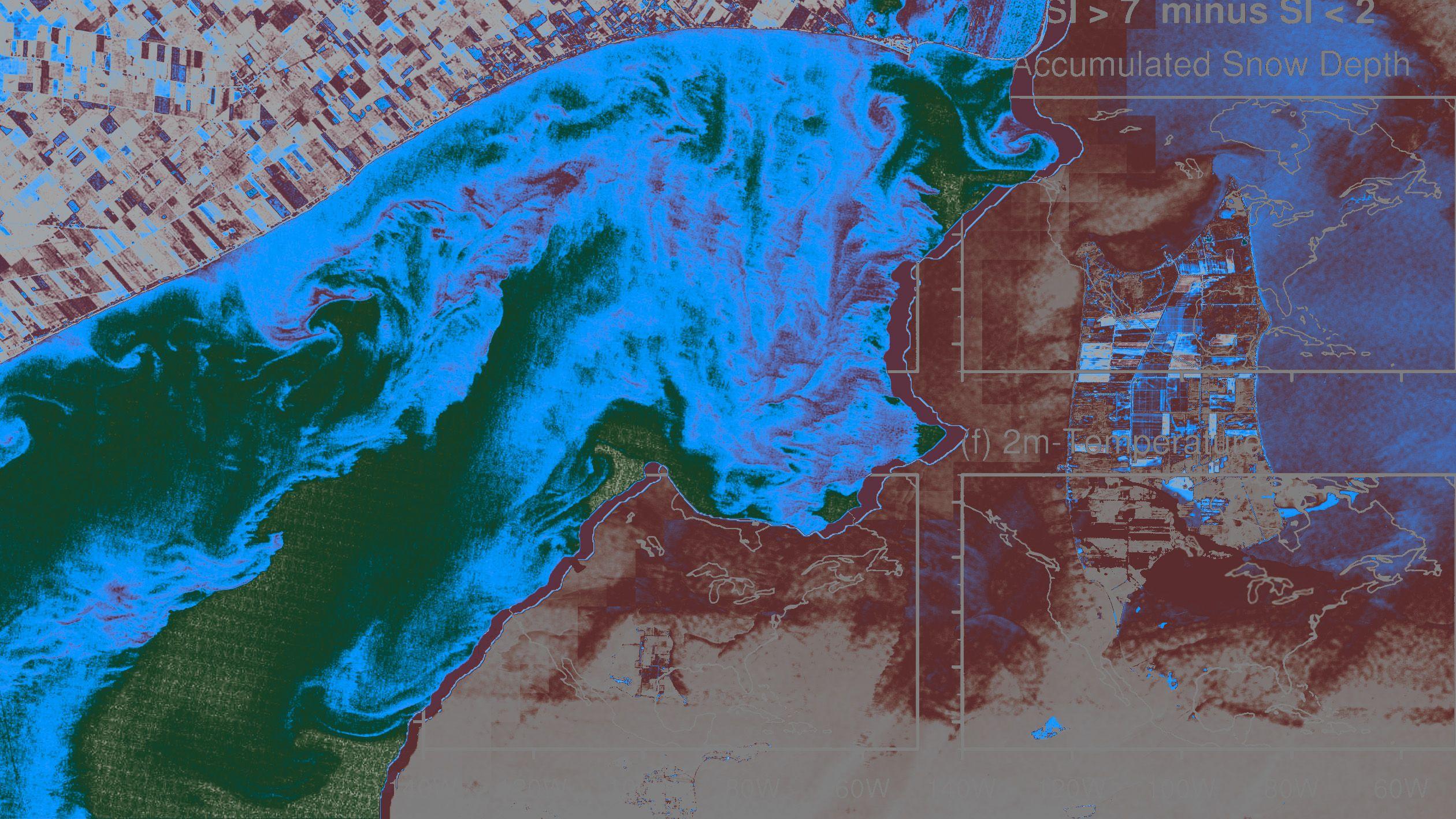
Scanning probe microscopy technique could open the door to molecular machines
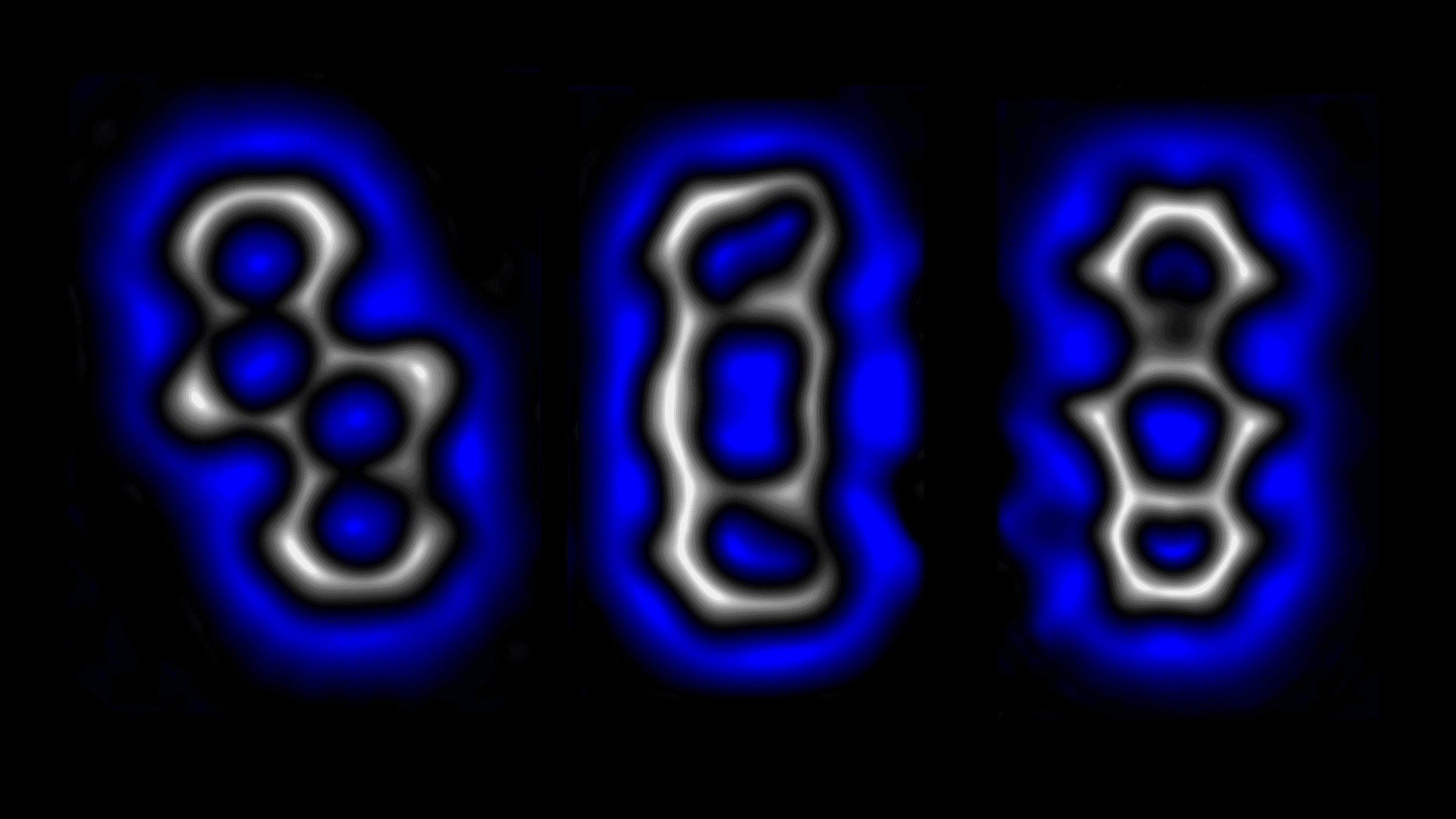
Computer simulations identify new ways to boost the skin’s natural protectors
- Accelerated Discovery
The first atomic-resolution images of extraterrestrial molecules
Thieme trains ibm rxn for chemistry with high-quality data.
- See more of our work on Physical Sciences
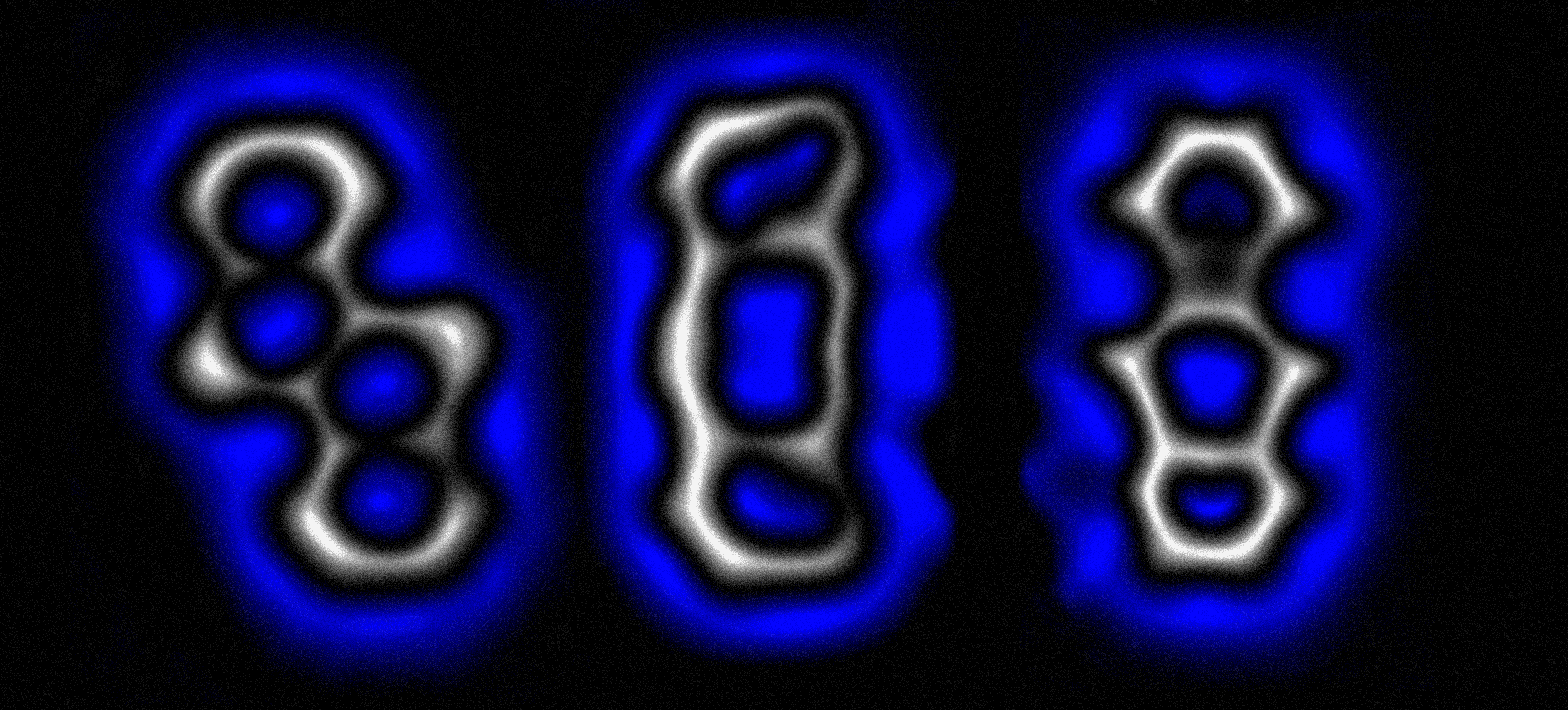
Atom and Molecule Manipulation
Publications.
- Alexander Grun
- Zhi-Lun Liu
- Bowen Zheng
- APL Mach. Learn.
- Nathaniel Park
- Jannis Born
- MRS Spring Meeting 2024
- Olivier Maher
- Manuel Jiménez
- Nature Communications
- Refaldi Intri Dwi Putra
- Tatsuya Ishikawa
- ICASSP 2024
- Marianna Rapsomaniki
- AMLD EPFL 2024
Related topics
Life sciences, computer science, mathematical sciences.
Thank you for visiting nature.com. You are using a browser version with limited support for CSS. To obtain the best experience, we recommend you use a more up to date browser (or turn off compatibility mode in Internet Explorer). In the meantime, to ensure continued support, we are displaying the site without styles and JavaScript.
- View all journals
Physical chemistry articles from across Nature Portfolio
Physical chemistry is one of the traditional sub-disciplines of chemistry and is concerned with the application of the concepts and theories of physics to the analysis of the chemical properties and reactive behaviour of matter. While also at the interface between physics and chemistry, it is distinct from chemical physics.
Related Subjects
- Biophysical chemistry
- Chemical physics
- Electron transfer
- Energy transfer
- Excited states
- Reaction kinetics and dynamics
- Optical spectroscopy
- Thermodynamics
Latest Research and Reviews
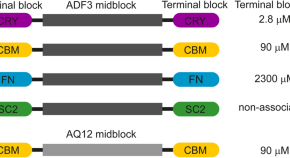
Bursting of condensates
Condensates with a shell can be formed by liquid-liquid phase separation and can burst like viscous bubbles by nucleation and growth of a hole in the shell surrounded by a rim. The authors develop a model to extract a broad range of rheological properties for spherical shells to understand the conditions for bursting.
- Isabell Tunn
- Grégory Beaune
- Markus B. Linder
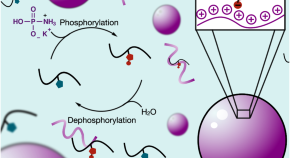
Active droplets through enzyme-free, dynamic phosphorylation
Despite the importance of dynamic phosphorylation in biology, enzyme-free, synthetic systems that use dynamic phosphorylation to regulate supramolecular processes are unexplored. Here, the authors report an enzyme-free chemical reaction cycle that can dynamically phosphorylate amino acids and peptides using simple phosphorylating agents and regulate supramolecular functions.
- Simone M. Poprawa
- Michele Stasi
- Job Boekhoven
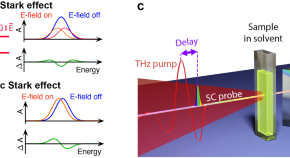
Time-resolved THz Stark spectroscopy of molecules in solution
Stark spectroscopy of molecules in liquid solutions was once challenging due to orientation effects, solved by freezing but limiting ambient studies. Now, THz Stark spectroscopy with intense terahertz pulses enables dynamic analysis of molecules in both non-polar and polar solvents at any temperature, advancing conventional methods.
- Bong Joo Kang
- Egmont J. Rohwer
- Thomas Feurer
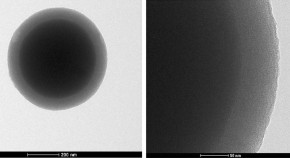
Water-dispersable photoreactors based on core–shell mesoporous silica particles
- Andrzej Baliś
- Dominika Lorens
- Szczepan Zapotoczny
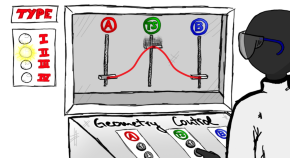
Geometry-controlled reactivity and dynamics in organic molecules
Geometry control in organic reactions can be used to promote dynamic processes or stabilize reactive transition states. This Review discusses the concept of geometry control, its impact on transition states and bonding, as well as the reactivity and properties that emerge as a consequence of constraining molecules.
- Promeet K. Saha
- Trung Tran Ngoc
- Johannes F. Teichert
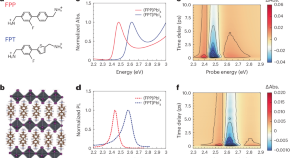
Exciton polaron formation and hot-carrier relaxation in rigid Dion–Jacobson-type two-dimensional perovskites
The detailed interplay between electronic and lattice dynamics in two-dimensional perovskite materials remains elusive. Here the authors establish the room-temperature polaronic nature of the excitons in two-dimensional Dion–Jacobson-type perovskites.
- Somnath Biswas
- Gregory D. Scholes
News and Comment
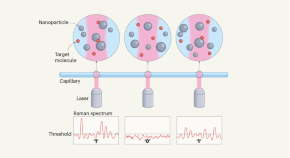
Nanoparticle fix opens up tricky technique to forensic applications
A technique called surface-enhanced Raman spectroscopy can detect tiny quantities of compounds in solution, but has been difficult to use for quantitative analysis. A digital approach involving nanoparticles suggests a way forward.
- Peter J. Vikesland
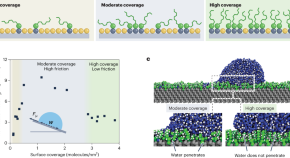
Towards zero droplet friction
Surface heterogeneities lead to friction between droplets and solid surfaces, limiting the performance of the latter in a number of applications. A combination of friction force measurements and atomistic molecular dynamics simulations now sheds light on the influence of molecular scale heterogeneities on droplet friction.
- Abhinav Naga
- Doris Vollmer
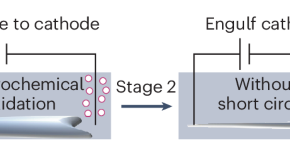
Directed transfer of liquid metal droplets between electrodes
Electric fields offer an easy means to manipulate liquid metal droplets. Now, directed droplet transfer between immersed electrodes is achieved in an alkaline electrolyte without electrical short circuit.
- Gerd Mutschke
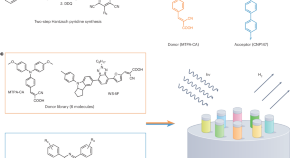
Scaling up discovery
By systematically exploring a large chemical space using automated experimentation, a high-performing organic photocatalyst for hydrogen evolution is discovered.
- Seonghwan Kim
- Charles M. Schroeder
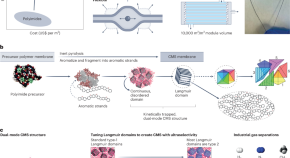
Polyimide-derived carbon molecule sieve membranes for gas separations
Polyimide-derived carbon molecular sieve (CMS) membranes mark an important step for various current, key energy-intensive separations. The excellent separation performance combined with economical scalability make CMS membranes ready to enable energy-transition-focused gas separations.
- Zhongyun Liu
- William J. Koros
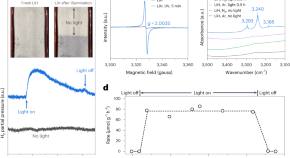
Photodriven nitrogen fixation by lithium hydride
Dinitrogen (N 2 ) fixation to ammonia (NH 3 ) is typically challenging under mild conditions. Now, lithium hydride (LiH) is shown to mediate photodriven N 2 fixation under ambient conditions. Under ultraviolet illumination, LiH is photolysed to release H 2 , leaving electrons residing in surface hydrogen vacancies, which facilitate N 2 activation and photocatalytic NH 3 synthesis.
Quick links
- Explore articles by subject
- Guide to authors
- Editorial policies
Explore your training options in 10 minutes Get Started
- Graduate Stories
- Partner Spotlights
- Bootcamp Prep
- Bootcamp Admissions
- University Bootcamps
- Coding Tools
- Software Engineering
- Web Development
- Data Science
- Tech Guides
- Tech Resources
- Career Advice
- Online Learning
- Internships
- Apprenticeships
- Tech Salaries
- Associate Degree
- Bachelor's Degree
- Master's Degree
- University Admissions
- Best Schools
- Certifications
- Bootcamp Financing
- Higher Ed Financing
- Scholarships
- Financial Aid
- Best Coding Bootcamps
- Best Online Bootcamps
- Best Web Design Bootcamps
- Best Data Science Bootcamps
- Best Technology Sales Bootcamps
- Best Data Analytics Bootcamps
- Best Cybersecurity Bootcamps
- Best Digital Marketing Bootcamps
- Los Angeles
- San Francisco
- Browse All Locations
- Digital Marketing
- Machine Learning
- See All Subjects
- Bootcamps 101
- Full-Stack Development
- Career Changes
- View all Career Discussions
- Mobile App Development
- Cybersecurity
- Product Management
- UX/UI Design
- What is a Coding Bootcamp?
- Are Coding Bootcamps Worth It?
- How to Choose a Coding Bootcamp
- Best Online Coding Bootcamps and Courses
- Best Free Bootcamps and Coding Training
- Coding Bootcamp vs. Community College
- Coding Bootcamp vs. Self-Learning
- Bootcamps vs. Certifications: Compared
- What Is a Coding Bootcamp Job Guarantee?
- How to Pay for Coding Bootcamp
- Ultimate Guide to Coding Bootcamp Loans
- Best Coding Bootcamp Scholarships and Grants
- Education Stipends for Coding Bootcamps
- Get Your Coding Bootcamp Sponsored by Your Employer
- GI Bill and Coding Bootcamps
- Tech Intevriews
- Our Enterprise Solution
- Connect With Us
- Publication
- Reskill America
- Partner With Us
- Resource Center
- Bachelor’s Degree
- Master’s Degree
The Top 10 Most Interesting Exercise Science Research Topics
The field of exercise science is rapidly growing as new technologies like computer visualization and biotracking deepen our understanding of human physiology. New technologies allow us to better prevent injuries, allowing athletes to push their limits beyond what we thought possible. Thanks to this, there is no shortage of exercise science research topics to write about.
In this article, we’ll show you 10 great examples of exercise science research topics. If you are pursuing a degree in this field, you’ll learn better ways of finding good exercise science research paper topics and how to develop stronger exercise science research questions for your projects.
Find your bootcamp match
What makes a strong exercise science research topic.
Strong exercise science research topics are timely and relevant. Leading researchers and sports institutions should still be discussing them at the time you are writing your research paper. The Strength and Conditioning Journal is a great place to find some of the latest activity research topics including articles on different health benefits, health issues, preventive interventions, and rehabilitation after injury.
Your topic should be broad enough to find enough strong sources, but narrow enough to stand out. Controversial topics are acceptable if you have enough evidence to back up your research. If it’s your first paper, consider approaching a less complex topic. You can also ask your teacher for suggestions if you are struggling to find strong university-level topics. Remember to follow the guidelines for choosing a topic set by your institution.
Tips for Choosing an Exercise Science Research Topic
- Choose a topic that intrigues you. A personally interesting topic will motivate you during the research process. If you have a personal connection to what you are researching, you will have a much easier time writing about it.
- Narrow your topic. By picking a specific subject, you will have an easier time finding credible sources to support your research. By reducing the number of books and articles to read and only choosing literature that is immediately relevant to your topic idea, you also won’t have to spend as much effort before starting to write.
- Talk to your teacher or academic advisor. Your teachers are great resources you have at your disposal. They have experience choosing topics for college students and will most likely be able to help you pick a topic you’ll find engaging to research.
- Look through journals to find exciting topics. Review topics published in the journals like the Journal of Strength and Conditioning Research. These research journals publish the latest fitness research papers and can help you find a topic that interests you.
- Consider the research interests of your teacher. It’ll be convenient if your research topic matches their expertise, as they’ll be able to provide you with better feedback during your research process.
What’s the Difference Between a Research Topic and a Research Question?
A research topic is a specific area of study. Sprains in adult athletes or rehabilitation for brain injuries, for example, are research topics. A research question is a way to add new knowledge to that area of study. Examples of research questions would be “What is the role of nutrition in the recovery of sprains in athletes?” or “What is the effect of cardio exercises on adults with brain injuries?”
The goal of your research should be focused around answering the research question. Your answer will help you and others to understand the topic better. Research questions tend to be more specific than the research topics in exercise science.
How to Create Strong Exercise Science Research Questions
To create strong exercise science research questions, you should first become familiar with the topic the question concerns. The answer to your research question should be supported by previous studies done on the topic. Reading previously published studies will help you learn more while preventing you from doing any redundant research.
The scientific method helps exercise scientists better understand their field. Your question should start with how, why, when, or what questions. The scope of your question must be manageable in relation to how long you have to answer it.
Questions that require in-depth experiments may be beyond your reach if you only have a week. Before choosing the question that will lead your research, consider the time it will take you to answer it.
Top 10 Exercise Science Research Paper Topics
1. benefits of resistance training for reducing the negative consequences of aging.
Metabolic resistance training can counter the adverse effects of aging. According to a 2019 study by the Journal of Strength and Conditioning Research, only nine percent of older adults in the United States practice any form of resistance or weight lifting exercises. Metabolic resistance training for elderly residents has become a recently popular topic, as it has been proven to increase muscle mass and muscle strength and relieve intervertebral joint pain.
2. Determining the Minimal Amount of Physical Exercise Required to Maintain Strength and Stamina
Long periods of physical inactivity harm physical fitness. Scientists want to know how much physical exercise can prevent the loss of muscle strength. The British Journal of Sports Medicine published an article that took an in-depth look into the negative effects of sedentary behavior . There are plenty of physiology research topics about improving daily life with an active lifestyle.
3. Effect of a Low-Carbohydrate Ketogenic Diet on Body Mass on Olympic Weightlifting Athletes
Exercise scientists have realized the impact of nutrition on endurance, body composition, and recovery. This has led to theories being tested of controversial ideas in nutrition and measuring their effects on muscle strength.
For example, a study by the Journal of Strength and Conditioning Research shows that ketogenic diets reduce mass without compromising performance . If you are interested in becoming a nutritionist , researching the role of nutrition in relation to physical activity could be beneficial for your future career.
4. The Effect of Exercise on the Gut Microbiome
The role of exercise on the gut microbiome is an exciting topic in exercise science. In 2019, researchers found some proof that regular exercise increased gut bacteria and contributed to the health of the gut microbiome, as mentioned in a study that was published in Exercises and Sport Science Reviews.
The gut microbiome produces a wide range of biomolecules, including neurotransmitters, that regulate mood and anxiety. Researchers believe that healthy gut bacteria can improve our mental fitness and health. Their research also leads them to believe that gut bacteria can improve the body’s ability to fight inflammatory illnesses and certain types of cancer.

5. Wearable Technology for Health Monitoring and Sport Performance
Smartwatches pack sensors that can track your movement patterns, heart rate, and oxygen levels. In recent years, these bio trackers have become increasingly affordable and easy to use. Researchers at the School of Kinesiology at the University of Michigan have used these sensors to track elderly patients and alert their caregivers in real-time.
In sports, kinesiologists use this technology to measure aerobic speed and the onset of fatigue. With a degree in kinesiology , you can work with elite athletes and improve their athletic performance using these technologies.
6. Optimizing Human Movement Potential for Elite Athletes
Exercise scientists study the biomechanics of human movement to improve the body’s longevity. Understanding the human body allows researchers to develop primary injury prevention methods.
Personal trainers help athletes achieve extraordinary performance without the risk of musculoskeletal injury. If you want to become a certified personal trainer , physiology research paper topics in relation to this topic may be of interest to you.
7. Equity in Sports
Exercise scientists are also concerned with the social aspects of sports. Many athletes live under adverse conditions and need to make extra efforts to match the achievements of others. Equity in sports is currently a very important exercise science topic. Researchers find solutions to increase access to professional sports by improving policies to prevent racism, sexism, and other forms of discrimination.
If you want to become a sports agent or an athletic director, look for physiology research topics in relation to equity in sports. Becoming a sports manager takes a certain level of education in the professional fitness industry, such as a graduate degree in sports management .
8. Effect of Bike Commuting on Insulin Sensitivity, Cardiorespiratory Fitness, and Adipose Tissue
Exercise scientists look for solutions to public health problems like diabetes and obesity. A study published in the British Journal of Sports Medicine found that commuting by bike has a significant impact on insulin sensitivity , improving cardiovascular fitness, and reducing belly fat.
With cardiometabolic health such as cardiovascular disease, being an urgent topic in the United States, considering the prevalence of obesity, there is plenty of research on the subject, making it a great initial topic.
9. Reducing Lower Back Pain by Increasing Physical Activity
With athletes having a high sports injury risk, and many injuries causing severe back pain, pain management has become an important topic in exercise science. Exercise scientists research ways to reduce pain using principles in kinesiology and found that increasing physical activity can reduce lower back pain , according to a study published in the British Journal of Sports Medicine.
10. Applications of Kinesiology in the Treatment of Movement Dysfunctions
Exercise scientists have been studying the relationship between movement and neuroplasticity for a long time. Physical activity during rehabilitation for stroke patients or patients with brain injuries has proven to reduce movement dysfunctions. Understanding the effects of exercise on neural networks is an important research topic in the field of rehabilitation.
Other Examples of Exercise Science Research Topics & Questions
Exercise science research topics.
- Assessment of the use of virtual reality rehabilitating brain-injured or stroke patients
- The role of caffeine as a sports performance enhancer for optimal performance
- Current and future perspectives on the effects of nutrition on physical exercise performance
- Hormonal responses in older men to metabolic resistance training
- Comparison of occupational physical activity and leisure physical activity on cardiovascular fitness
Exercise Science Research Questions
- What are the benefits of physical activity for cognitive health?
- What is the impact of VR training on human body composition testing?
- What are the advantages of wearing an elevation training mask during physical exercise?
- What are the physiological causes of mental fatigue on endurance performance?
- How does physical exercise improves mental health and academic performance in university students?
Choosing the Right Exercise Science Research Topic
When choosing the right exercise science research topic, consider researching topics that you are already familiar with, as your existing knowledge may help you with your research. You could also ask your academic advisor, other staff in the department of exercise science, or even physical therapy professionals about current trends in exercise science and injury recovery.
Physical fitness and training performance are common themes in exercise science research. Recent articles published by the British Journal of Sports Medicine or the Journal of Strength and Conditioning Research are a great place to start. Make sure you choose a manageable research topic. Your teacher can help you make sure your research topic is relevant before you begin.

"Career Karma entered my life when I needed it most and quickly helped me match with a bootcamp. Two months after graduating, I found my dream job that aligned with my values and goals in life!"
Venus, Software Engineer at Rockbot
Exercise Science Research Topics FAQ
Exercise science is important because it tries to find solutions to problems concerning the optimal performance of athletes and the general health of the human population. Exercise science also helps develop new rehabilitation methods for injury recovery and pain management.
Yes, kinesiology is a STEM discipline that studies exercise and movement. Breakthroughs in kinesiology come from scientific research and the use of the scientific method. It is a wing of the department of exercise science of many universities.
The average salary of an exercise physiologist is $50,280 per year, which is above the national average, according to the Bureau of Labor Statistics. About half of all exercise physiologists are self-employed, while others work in hospitals, spas, and physical therapy offices.
With a Bachelor’s Degree in Exercise Science, you can get a job as a physical therapist or a fitness instructor. With a graduate degree in exercise science, you can become a sports agent or an athletic director.
About us: Career Karma is a platform designed to help job seekers find, research, and connect with job training programs to advance their careers. Learn about the CK publication .
What's Next?
Get matched with top bootcamps
Ask a question to our community, take our careers quiz.

Leave a Reply Cancel reply
Your email address will not be published. Required fields are marked *

- Log in
- Environmental Analysis
- Food Analysis
- Pharmaceutical Analysis
- LIMS & ELN
- Electron & Ion Microscopy
- Image Processing
- Light Microscopy
- Raman Spectroscopy
- Scanning Probe Microscopy
- Electrophoresis
- Gas Chromatography
- Liquid Chromatography
- Sample Preparation
- Atomic Spectroscopy
- Infrared (IR) Spectroscopy
- Magnetic Resonance Spectroscopy (MRS)
- Mass Spectrometry
- NMR Spectroscopy
- UV Spectroscopy
- Biochemistry & Biopharma
- Bioinformatics
- Bioprocessing & Bioanalysis
- Cell & Gene Therapy
- Cell Biology
- Chemical Biology
- Cytometry & Flow Cytometry
- Food Science (GMO)
- Microbiology
- Model Organisms
- Molecular Biology
- Neuroscience
- Pharmacology
- Plant Biology
- Protein Science
- Proteomics & Genomics
- Spatial Biology
- Stem Cell Biology
- Industrial Chemistry
- Inorganic Chemistry
- Medicinal Chemistry
- Organic Chemistry
- Physical Chemistry
- Energy & Battery Research
- Materials Science
- Nanoscience & Nanotechnology
- Digital Events Hub
- Remember me
Not registered yet? Click here to register now.
HUB REGISTRATION
Already registered? Click here to log in to the hub.
Login information
Personal profile.
- I have read and agree to Wiley's Terms of Use and Privacy Policy . I understand that my data may be used to receive news and updates from Wiley and I consent to receive marketing messaging from Wiley. I understand that I can unsubscribe at any time.
Could you spare a minute or two to help us provide more valuable science content?
Topic: Physical Science
Physical science is a branch of natural science that studies non-living systems and the fundamental laws and principles that govern them. It includes areas such as physics, chemistry, astronomy, and earth science. Physical science explores the properties, interactions, and behavior of matter and energy, as well as the forces and phenomena that shape the world we live in. It utilizes scientific methods and experimentation to investigate and understand the physical processes and natural phenomena in the universe.
Transition Metals in Catalysis: From Precious to Practical
E. coli bioprocessing: pioneering advances in biotechnology, the power of qpcr in advancing cell & gene therapy research, how biotechnological advances are transforming monoclonal antibody production, flexible systems for evolving demands: osd granulation in modern pharmaceutical manufacturing, pfas in our environment: exploring effects, widespread contamination, and detection methods, the microled breakthrough: shaping the future of the near-to-eye displays, biomaterial microstructure and properties: the relevance of biomimetics and bioengineering, exploring the behavior of materials: a comprehensive guide to thermal analysis and the push for a sustainable future, nanoelectronics and its new materials – a new era of nanoscience, how charged aerosol detection is revolutionizing hplc analysis, unlocking the mysteries of complex nanoscale systems, lipidomics volume 3, unlocking the potential of battery research, exploring the possibilities of increasing energy density and efficiency in rechargeable batteries, solutions for the analysis of pfas forever chemicals, gravimetric analysis: determining the density of a sample for various applications, advances in light emission.
Reports and Studies
Providing compelling information and analysis to address societal challenges, science policy reports.
The APS Panel on Public Affairs (POPA) oversees reports present technical assessments in areas of interest to the physics community, policy decision-makers, and the general public. Topics covered in these reports range from energy and the environment to national security.

Task force and committee reports
Aps annual reports.
Annual reports provide our members, donors, and the physics community with transparent information about our initiatives, successes, and finances.
APS studies serve occasional needs outside the scope of POPA reports by providing detailed data on technical issues of importance to APS, the physics community, and policymakers. For more information about APS studies, please contact the Government Affairs team .
How America can look within to achieve energy security and reduce global warming
APS study group report, 2008
Boost-phase intercept systems for national missile defense: Scientific and technical issues
APS study group report, 2004
Science and technology of directed energy weapons
APS study group report, 1987
Radionuclide release from severe accidents at nuclear power plants
APS study group report, 1985
Research planning for coal utilization and synthetic fuel production
APS study group report, 1981
Solar photovoltaic energy
APS study group report published in Physics Today , 1979
Nuclear fuel cycles and waste management
APS study group report, 1978
Light-water reactor safety
APS study group report, 1975
Physics problems relating to energy technologies: Radiation effects on materials
Technical aspects of the more efficient use of energy.
APS studies, published in AIP Conference Proceedings, 1975

Publications
APS publications are a trusted source of peer-reviewed research, in-depth articles, current news, and topical commentary about physics and its place in the world.

Science Policy and Advocacy
Make your voice heard and learn how we're working on behalf of APS members and the physics community in science policy.

APS Leadership and Governance
Meet our volunteer and staff leadership, and explore how the organization is structured and run.

Research Dissemination
APS provides many opportunities for physicists to share their research with the wider scientific community.
Join your Society
If you embrace scientific discovery, truth and integrity, partnership, inclusion, and lifelong curiosity, this is your professional home.
- Skip to main navigation
- Skip to search
- Skip to content
- Press Release Archive
- AAPT Committees
- Area Committees
- Annual Report
- Job Opportunities
- Code of Conduct
- Mission Statement
- Organization
- Marketing Opportunities
- Privacy Statement
- Strategic Plan
- AAPT's DEI Strategy
- COMMUNITIES
- 2024 AAPT Summer Meeting
- 2024 AAPT Winter Meeting
- National Meetings
- Highlights of Past Meetings
- Meeting Abstract Archive
- TYC Tandem Meeting
- Physics Department Chairs Conference
- Awards & Medals
- Collaborative Projects
- U.S. Physics Team
- Grants & Scholarships
- Contests & Competitions
- New Faculty Programs
- K-12 Portal
- Virtual Coffee Hour
- Publications Information
- AJP Website
- AAPT Book Archive
- Browse AJP Online
- Advertising Media Kit
- Browse TPT Online
- Video Abstracts
- The Physics Teacher TOC
- TOC Archive
- eNNOUNCER Archive
- AAPT Annual Report
- Physical Review Physics Education Research
- Physics Today
- AAPT Section News Archive
- News Archive
- AAPT ComPADRE Digital Library
- Joining AAPT - Levels & Dues
- Member Benefits
- Renew your membership
- View or update your profile
- Member Directory
- How to Get Involved with AAPT
- Testimonials
- Member Spotlight Archive
- In Memoriam
- Diversity, Equity, and Inclusion in Physics
- Sustainability in Physics
- Colleges and Universities
- AAPT ComPADRE Digital library
- Speakers Bureau
- AAPT Career Center
- Program Review
- Media Relations
- Policy & Legislation
- Guidelines and Recommendations
- AAPT Sections
- Affiliated Organizations
- PERTG & PERLOC
- Supporters of AAPT
- Planned Giving
- Volunteering
- Publications & Journals ›
Powerful Ideas In Physical Science
Publications section navigation show navigation.
- American Journal of Physics TOC
- Section News
- Open access
- Published: 16 May 2024
Experiences of UK clinical scientists (Physical Sciences modality) with their regulator, the Health and Care Professions Council: results of a 2022 survey
- Mark McJury 1
BMC Health Services Research volume 24 , Article number: 635 ( 2024 ) Cite this article
635 Accesses
Metrics details
In healthcare, regulation of professions is an important tool to protect the public. With increasing regulation however, professions find themselves under increasing scrutiny. Recently there has also been considerable concern with regulator performance, with high profile reports pointing to cases of inefficiency and bias. Whilst reports have often focused on large staff groups, such as doctors, in the literature there is a dearth of data on the experiences of smaller professional groups such Clinical Scientists with their regulator, the Health and Care Professions Council.
This article reports the findings of a survey from Clinical Scientists (Physical Sciences modality) about their experiences with their regulator, and their perception of the quality and safety of that regulation.
Between July–October 2022, a survey was conducted via the Medical Physics and Engineering mail-base, open to all medical physicists & engineers. Questions covered typical topics of registration, communication, audit and fitness to practice. The questionnaire consisted of open and closed questions. Likert scoring, and thematic analysis were used to assess the quantitative and qualitative data.
Of 146 responses recorded, analysis was based on 143 respondents. Overall survey sentiment was significantly more negative than positive, in terms of regulator performance (negative responses 159; positive 106; significant at p < 0.001). Continuous Professional Development audit was rated median 4; other topics were rated as neutral (fitness to practice, policies & procedures); and some as poor (value).
Conclusions
The Clinical Scientist (Physical Sciences) professional registrants rated the performance of their regulator more negatively than other reported assessments (by the Professional Standards Authority). Survey respondents suggested a variety of performance aspects, such as communication and fitness to practice, would benefit from improvement. Indications from this small dataset, suggest a larger survey of HCPC registrants would be useful.
Peer Review reports
In Healthcare, protection of patients and the public is a core principle. Part the framework of protections, includes regulation of professions [ 1 ]. This aims to mitigate risks such as the risk from bogus practitioners – insufficiently trained people acting as fully-trained professional practitioners, see Fig. 1 .
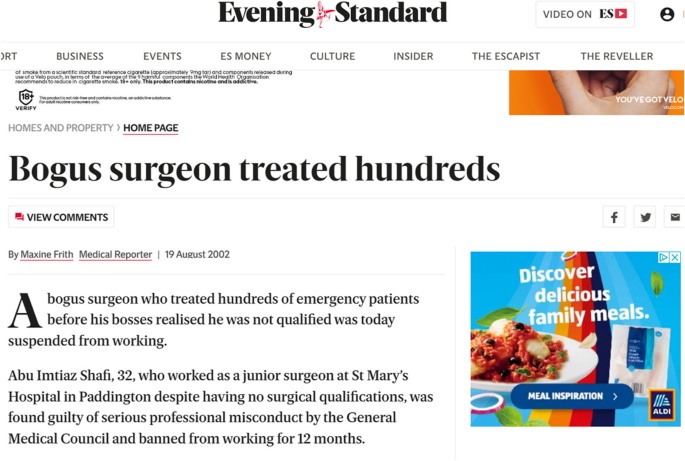
Recent UK media report on a bogus healthcare practitioner [ 2 ]
Regulation of professions ensures that titles (e.g. Doctor, Dentist, Clinical Scientist) are protected in law. The protected title means someone may only use that title, if they are on the national register, managed by the regulator – the Health and Care Professions Council (HCPC). It is a criminal offence to use a protected title if you are not entitled to do so [ 3 ]. There are a large number of regulators in healthcare – see Table 1 . Most of the regulators manage a register for one profession, except the HCPC which regulates 15 professions.
To be included on the register, a candidate must meet the regulators criteria for knowledge and training, and a key element to remain, is to show evidence of continuous professional development (CPD). Being on the register ensures that a practitioner has met the appropriate level of competence and professional practice.
For many healthcare workers, being on the HCPC register is a compulsory requirement to be appointable to a post. They must pay the necessary annual fees, and abide by the policies drawn-up by the regulator, and generally professions have no choice of regulator – these are statutory bodies, setup by government.
Recently, there has been considerable public dissatisfaction with the activity & performance of some regulators, notably Ofwat [ 4 ], and Ofgem [ 5 ]. Healthcare workers should expect a high level of professionalism, efficiency, and integrity from a regulator, as the regulator’s performance directly affects staff and public safety.
In terms of the regulation of UK Clinical Scientists, there is a dearth of data regarding experiences with the HCPC and views on the quality of regulation provided.
Findings are reported here from a 2022 survey of Medical Physicists and Engineers (one of the 16 job roles or ‘modalities’ under the umbrella of Clinical Scientist). The research aim was to assess experiences, and the level of ‘satisfaction’ with the regulator. For the remainder of this report, the term Clinical Scientist will be taken to mean Clinical Scientist (Medical Physicist/Engineer). The survey was designed to gather & explore data about opinions and experiences regarding several key aspects of how the HCPC performs its role, and perception of the quality & safety of regulation delivered.
A short survey questionnaire was developed, with questions aimed to cover the main regulatory processes, including registration & renewal, CPD audit, and fitness-to-practice. There were also questions relating more generally to HCPC’s performance as an organisation, e.g. handling of personal data. Finally, participants were asked to rate the HCPC’s overall performance and what they felt was the ‘value’ of regulation. The survey questions are listed in the Supplementary file along with this article.
Questions were carefully worded and there was a balance of open and closed questions. A five-point Likert score was used to rate closed questions. The survey was anonymous, and the questions were not compulsory, allowing the responders to skip irrelevant or difficult questions. The survey also aimed to be as short & concise as possible, to be a minimal burden to busy clinical staff & hopefully maximise response rate. There were a small number of questions at the start of the survey, to collect basic demographics on the respondents (role, grade, UK nation etc.).
The survey was advertised on the online JISC-hosted UK Medical Physics and Engineering (UKMPE) mail-base. This offered convenient access for the majority of Clinical Scientists. The survey was advertised twice, to allow for potential work absence, holiday/illness etc. It was active from the end of July 2002 until October 2022, when responses appeared to saturate.
The data is a combination of quantitative rating scores, and qualitative text responses. This allows a mixed-methods approach to data analysis, combining quantitative assessment of the Likert scoring, and (recursive) thematic analysis of the free-text answers [ 6 ]. Thematic analysis is a standard tool, and has been reported as a useful & appropriate for assessing experiences, thoughts, or behaviours in a dataset [ 7 ]. The survey questions addressed the main themes, but further themes were identified using an inductive, data-driven approach. Qualitative data analysis (QDA) was performed using NVivo (QSR International).
Two survey questions attempted to obtain an overall perception of HCPC’s performance: the direct one (Q12), and a further question’Would you recommend HCPC as a regulator…?’. This latter question doesn’t perhaps add anything more, and in fact a few respondents suggested it was a slightly awkward question, given professions do not have a choice of regulator – so that has been excluded from the analysis.
Study conduct was performed in accordance with relevant guidelines and regulations [ 8 , 9 ]. Before conducting the survey of Clinical Scientists, the survey was sent to their professional body, the Institute of Physics and Engineering in Medicine (IPEM). The IPEM Professional Standards Committee reviewed the survey questions [ 10 ]. Written informed consent was obtained from participants.
Data analysis
Data was collected via an MS form, in a single excel sheet and stored on a secure network drive. The respondents were anonymised, and the data checked for errors. The data was then imported into NVivo v12.
Qualitative data was manually coded for themes, and auto-coded for sentiment. An inductive approach was used to develop themes.
The sample size of responses allowed the use of simple parametric tests to establish the level of statistical significance.
Survey demographics
A total of 146 responses were collected. Two respondents noted that they worked as an HCPC Partner (a paid role). They were excluded from the analysis due to potential conflict of interest. One respondent’s responses were all blank aside from the demographic data, so they were also excluded from further analysis.
Analysis is based on 143 responses, which represents ~ 6% of the UK profession [ 11 ]. It is arguable whether it is representative of the profession at this proportion of response – but these responses do offer the only sizeable pool of data currently available. The survey was aimed at those who are on the statutory register as they are most likely to have relevant interactions & experiences of the HCPC, but a small number of responses were also received from Clinical Technologists (Medical Technical Officers-MTOs) and Engineers (CEs) and these have been included in the analysis. Figure 2 shows the breakdown in respondents, by nation.
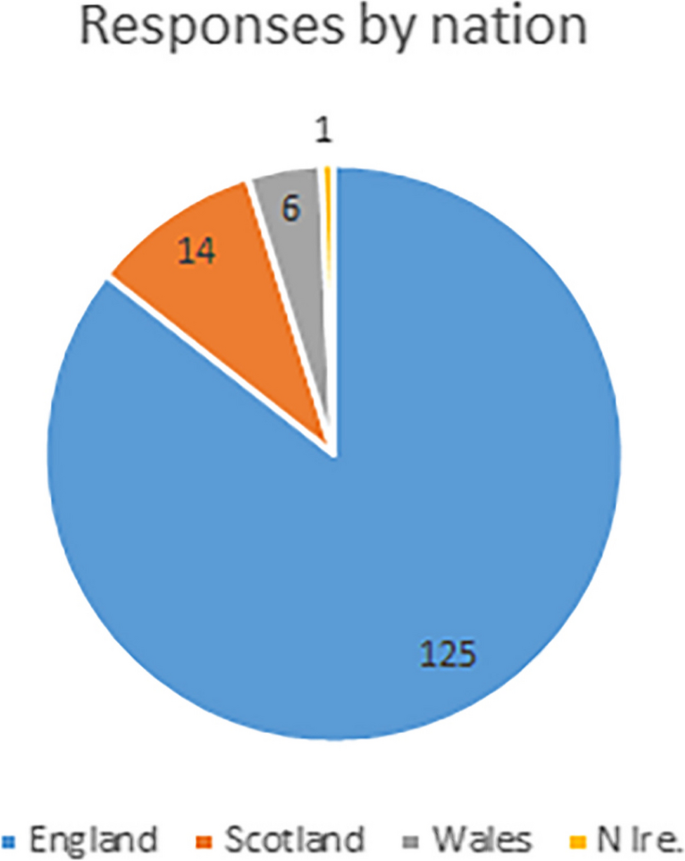
Proportion of respondents, by nation
Of the respondents, 91% are registered Clinical Scientists, and would therefore have a broad range of experience with HCPC and its processes. Mean time on the register was 12 yrs. Respondents show a large range in seniority, and their roles are shown in Fig. 3 (CS-Clinical Scientist; CE-Clinical Engineer; MTO-Medical Technical Officer/Technician; CS-P are those working in private healthcare settings, so not on Agenda for Change (AfC) pay bands).
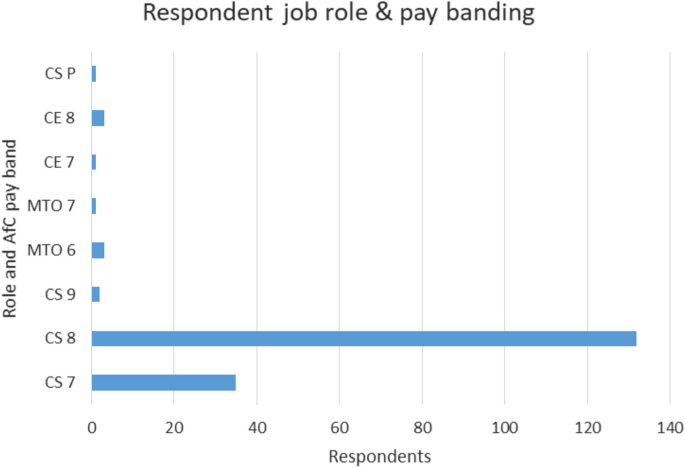
Breakdown in respondents, by role and pay banding
These data can be compared with the most recent HCPC ‘snapshot’ of the CS registrants (find here: Registrants by profession snapshot—1967 to 2019 | ( https://www.hcpc-uk.org/resources/data/2019/registrant-snapshot/ )).
The perception of overall regulator performance, can be assessed in two ways – one interview question directly asked for a rating score, and the overall survey sentiment also offers additional insight.
The score for overall performance was a median of 3 (mean 2.7; response rate 90%) which suggests neutral satisfaction.
Respondents were not asked directly to explain this overall performance rating – themes were extracted from the questionnaire as a whole.
The auto-coded sentiment scores generated in the NVivo software are shown in Table 2 . There is a significantly stronger negative sentiment than positive for HCPC performance – moderate, strong and total sentiment scores are all higher for negative sentiment. The normal test for a single proportion (109), shows the negative and positive sentiment differences have statistical significance with p < 0.001. Whilst the PSA assessment of HCPC performance in 2022–23 shows 100% performance for 4 out of 5 assessment areas, survey data here from regulated professionals suggests considerably less satisfaction with HCPC. This raises associated questions about the relevance and validity of PSA assessment.
A large number of respondents seem to question the value of regulation. Whilst many accepted the value for it in terms of protecting the safety of the public, many questioned its relevance & benefit to themselves. Many respondents also queried the payment model where although the main beneficiaries of regulation are the public & the employer, it is the registrants actually pay the fees for registration. There was very little mention in survey responses, of benefit in terms of protected-title. These issues were amalgamated into Theme 1— Value of regulation , with the two sub-themes Value in monetary terms (value-for-money) and Value in professional terms (benefit and relevance to the individual professional) (see Table 3 ).
In the survey, several aspects of HCPC organisational performance were scored – handling of personal data, registration and renewal, engagement with the profession, audit, and the quality and usefulness of HCPC policies. These formed Theme 2 and its sub-themes.
A third theme Registrant competence and vulnerability , was developed to focus on responses to questions related to the assessment of registrant competence and Fitness To Practice (FTP) processes.
Finally, the survey also directly asked respondents if they could suggest improvements which would have resulted in higher scoring for regulation quality and performance. These were grouped into Theme 4.
Theme 1 – Value of regulation
Value in monetary terms.
The Likert score for value-for-money was a median of 2 (mean 2.3; response rate 100%) which suggests dissatisfaction. This is one of the few survey questions to elicit a 100% response rate – a clear signal of its importance for registrants.
There was a high number of responses suggesting fees are too expensive (and a significantly smaller number suggesting good value). This ties in with some respondents explaining that the ‘benefit’ from registration is mainly for the employer (an assurance of high quality, well-trained staff). Several respondents point to little ‘tangible’ benefit for registrants and query whether the payment model is fair and if the employer should pay registrant fees.
“Expensive fees for what appears to be very little support.” Resp094
“It seems that I pay about £100 per year to have my name written on a list. It is unclear to me what the HCPC actually does in order to justify such a high fee.” Resp014
“I get, quite literally, nothing from it. It’s essentially a tax on work.” Resp008
Several respondents suggested that as registration was mandated by the employer, it was in essence an additional ‘tax’ on their employment, which was highlighted previously by Unison [ 12 ]. A comparator for payment model, are the checks preformed on potential staff who will be working with children and vulnerable adults. In general, these ‘disclosure’ checks are paid for by the employer, however the checks are not recurrent cost for each individual, but done once at recruitment.
Value in professional terms & relevance
This was not a direct question on the questionnaire, but emerged consistently in survey responses. Aside from value-for-money, the value of regulation can also refer to more general benefit and relevance for a professional, for example in protecting a professional title or emphasising the importance of a role. Many respondents commented, in relation to the ‘value’ of regulation, about the relevance of the HCPC to them and their job/role.
The largest number of responses highlighted the lack of clarity about HCPC’s role, and also to note its lack of relevance felt by a significant proportion of respondents.
“Not sure I have seen any value in my registration except that it is a requirement for my role” Resp017
“I really fail to understand what (sic) the benefits of registration.” Resp018
“They do not promote the profession. I see no evidence of supporting the profession. I pay to have the title and I am not aware of any other benefits.” Resp038
Theme 2 – HCPC performance
Communication & handling data.
The survey questionnaire did not have a specific question relating to communication, therefore no specific Likert scores are available. Rather, communication was a sub-theme which emerged in survey responses. The response numbers related to positive (1) and negative experiences (50) clearly suggest an overall experience of poor communication processes (and statistically significant at p < 0.001 for a normal proportion test).
One respondent noted they had ‘given up’ trying to communicate with HCPC electronically. Several respondents also noted issues with conventional communication—letters from HCPC going to old addresses, or being very slow to arrive.
“…I have given up on contacting by electronic means.” Resp134
When trying to renew their registration, communication with HCPC was so difficult that two respondents noted they raised a formal complaint.
A number of respondents noted that when they eventually got through to the HCPC, staff were helpful, so the main communication issue may relate to insufficiently resourced lines of communication (phones & email) or the need for a more focussed first point of contact e.g. some form of helpdesk or triaging system.
“Recently long wait to get through to speak to someone… Once through staff very helpful.” Resp126
This topic overlaps with the next (Processing Registration & renewals) in that both involve online logins, website use etc.
Security & data handling was rated as neutral (median 3, mean 3.4; response rate 91%). Although responses were balanced in terms of satisfaction, a significant number noted a lack of knowledge about HCPC processes. There are almost equal proportions of respondents reporting no issues, some problems with handling of personal data, or insufficient knowledge to express an opinion.
Registration and renewal
The score for processing registrations & renewals, was a median of 4 (mean 3.5; response rate 92%) which suggests modest satisfaction.
The overall rating also suggests that the issues may have been experienced by a comparative minority of registrants and that for most, renewal was straightforward.
“They expected people to call their phone number, which then wasn’t picked up. They didn’t reply to emails except after repeated attempts and finally having to resort to raising a complaint.” Resp023
“Difficult to get a timely response. Difficult to discuss my situation with a human being…” Resp044
Although the Likert score is positive, the themes in responses explaining the rating, are more mixed. Many respondents mentioned either having or knowing others who had issues with registration renewal, and its online processes including payments. A few respondents mentioned that the process was unforgiving of small errors. One respondent, for example, missed ticking a box on the renewal form, was removed from the register and experienced significant difficulties (poor communication with HCPC) getting the issue resolved.
Some respondents noted issues related to a long absence from work (e.g. maternity/illness etc.) causing them to miss registration deadlines – for some, this seems to have resulted in additional fees to renew registration. It seems rather easy for small errors (on either side) to result in registrants being removed from the register. For registrants, this can have very serious consequences and it can then be difficult and slow to resolve this, sometimes whilst on no pay. There have also been other reported instances of renewal payment collection errors [ 13 ].
“I had been off work… and had missed their renewal emails…I was told that there would be no allowances for this situation, and I would have to pay an additional fee to re-register…” Resp139.
Some respondents raised the issue of exclusion – certain staff groups not being included on the register—such as Clinical Technologists and Clinical Engineers. This desire for inclusion, also points to a perception of value in being on the register. One respondent raised an issue of very difficult and slow processing of registration for a candidate from outside the UK.
“Staff member who qualified as medical physicist abroad…has had a dreadful, drawn out and fruitless experience.” Resp135
Overall, many respondents noted difficulties in renewing registration and issues with HCPC’s online processes. Some of these issues (e.g. website renewal problems) may have been temporary and are now resolved, but others (e.g. available routes for registration) remain to be resolved.
Audit process & policies
In the survey, 12% respondents reported having been audited by HCPC regarding their CPD (response rate 97%). This is well above the level of 2.5% of each profession, which HCPC aims to review at each renewal [ 14 ], and similar values reported by some professional bodies [ 15 ]. The participants seem representative, although two respondents mentioned their perception of low audit rates. Data on CPD audit is available here: https://www.hcpc-uk.org/about-us/insights-and-data/cpd/cpd-audit-reports/
Respondents rated the process of being audited as a median of 4 (mean 3.7), which is the joint highest score on the survey, pointing to satisfaction with the process. From the responses, the overall perception could be summed up as straight-forward, but time-consuming. Without regular record-keeping, unfortunately most audits will be time-consuming – the HCPC more so, as it is not an annual audit, but covers the two preceding years.
Some respondents did find the process not only straight-forward, but also useful (related to feedback received). However, responses regarding feedback were mixed, with comments on both good, and poor feedback from HCPC.
“Not difficult but quite long-winded” Resp008
“Very stressful and time consuming” Resp081
“While it was a lot of work the process seemed very thorough and well explained.” Resp114
The HCPC’s policies & procedures were rated as a median of 3 (mean 3.2; response rate 98%). This neutral score could suggest a mixture of confidence in HCPC practise. This score may also reflect the fact that the majority of respondents had either not read, or felt they had no need to read the policies, and so are largely unfamiliar with them.
The reasons for this lack of familiarity are also explained by some respondents – four commented that the policies & procedures are rather too generic/vague. Three respondents noted that they felt the policies were not sufficiently relevant to their clinical roles to be useful. This may be due to the policies being written at a level to be applicable to registrants from all 16 modalities – and perhaps a limitation of the nature of HCPC as a very large regulator. Familiarity seemed mainly to be restricted to policies around registration, and CPD. There were slightly lower response levels for positive sentiment (6), than negative sentiment (9).
“I’ve never had cause to read them.” Resp115
“Detached from the real clinical interface for our professions…” Resp083
HCPC split their policies into ‘corporate’- which relate to organisational issues (e.g. equality & diversity; find them here: Our policies and procedures | ( https://www.hcpc-uk.org/about-us/corporate-governance/freedom-of-information/policies/#:~:text=Our%20main%20policies%20and%20procedures%201%20Customer%20feedback,scheme%20...%207%20Freedom%20of%20Information%20Policy%20 )) and those more relevant to professions (e.g. relating to the register; find them here: Resources | ( https://www.hcpc-uk.org/resources/?Query=&Categories=76 )).
One respondent noted not only that the policies were ‘as you might expect’, but felt the policies were less demanding than those from other similar bodies such as the CQC ( https://www.cqc.org.uk/publications ).
“…Other regulatory bodies (such as the CQC for example) have policies and procedures that are a lot more challenging to comply with.” Resp022
Theme 3 – Registrant competence and vulnerability
In this survey, 3.5% (5/143) of respondents noted some involvement with the HCPC’s Fitness to Practice service. These interactions were rated at a median of 3 (mean 2.8) suggesting neutral sentiment.
Firstly, we can immediately see the level of interaction with the FTP team is very small. CS registrants represent approx. 2% of HCPC registrants, and the level of CS referrals to FTP in 2020–21 was 0.2% [ 16 ].
The data is a very small sample, but responses vary strongly, so it is worth digging a little further into the granularity of individual responses. Response scores were 1, 1, 2, 5, 5 – which are mainly at the extremes of the rating spectrum. The majority of respondents described poor experiences with the FTP team: errors, a process which was ‘extremely prolonged’, involved slow/poor communication, and processes which were ‘entirely opaque’.
“It is slow, the process was badly managed… and the system was entirely opaque,” Resp37
“They were hard to contact and I didn't feel they listened…no explanation, apology or assurance it would not happen again. It left my colleague disillusioned and me very angry on their behalf…” Resp044
Some respondents commented that the team were not only difficult to contact, but also didn’t seem to listen. At the end of a process which involved errors from HCPC, one respondent noted were ‘no explanation, apologies or assurance that it would not happen again’, leaving the registrant ‘disillusioned’. These experiences do not fit with the HCPC’s stated goal to be a compassionate regulator, see Fig. 4 . Arguably it is more difficult to change a culture of behaviour and beliefs, than to publish a corporate goal or statement of vision.
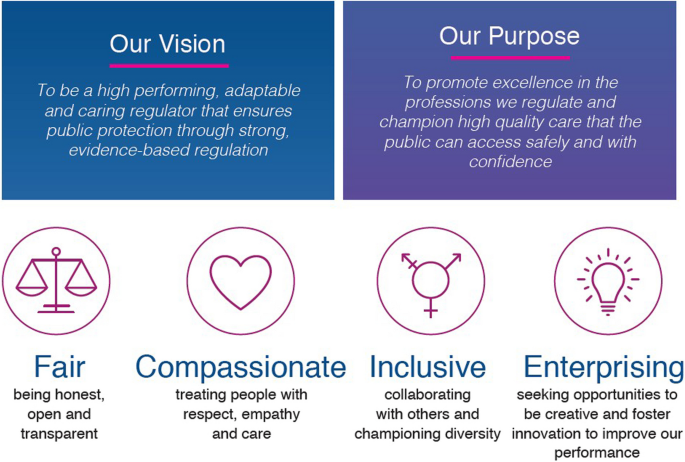
HCPC’s vision statement & purpose [ 17 ]
Some survey respondents have noted the necessity of regulation for our profession.
“Ultimately I am very grateful that I can register as a professional.” Resp024
Theme 4 – Suggestions for improved regulation
Following the question relating to overall performance, respondents were invited to suggest things which might improve their rating for HCPC’s performance and value. These suggestions were also combined with those which appeared in earlier survey responses.
Although we are in a current cost-of-living crisis, responses did not query simply high absolute cost of fees, but also queried the value/benefit of HCPC regulation for registrants. Many responses expressed doubt as to the added value & relevance of HCPC registration for them. They seem to point to a desire for more tangible benefit from their fees. Perhaps, given the costs and levels of scrutiny, registrants want some definite benefit to balance the scales .
“Cost less and do more for the people who are on the register.” Resp089
“Vastly reduced cost. Employer paying registrant fees.” Resp074
A significant number of responses pointed out that the main benefits of registration are for the public, and for employers – but that it is the registrants who pay for registration. Many queries why this should be, and whether there should be a different payment model, where for example employers pay.
Similarly, some respondents felt that the HCPC’s unusual position of regulating a large swathe of healthcare professions was not necessarily helpful for their profession or others.
Communication and response times are obviously an issue of concern for registrants, and improvements are needed based on the low satisfaction levels reported here. This is also linked to a wish for increased engagement with the CS profession.
“Engagement with the workforce, specialism specific development, reduced fees” Resp025
Some responses suggested they would be comforted by increased accountability / governance of HCPC including improved FTP efficiency.
“More accountability to registrants” Resp130
Finally, improvement in terms of additional registration routes for Engineers & Technical staff were also suggested. It may be damaging to work-place moral, if two professionals doing roles of a similar nature are not being governanced is the same way and if there is not parity of their gross salary due to mandatory professional fees & reductions.
Value-for-money : This will vary between individuals depending on many variables, such as upbringing & environment, salary, lifestyle priorities, political persuasion, and so on. However, many of these factors should balance in a large sample. In general, it can be suggestive of satisfaction (or lack of) with a service. The score here suggesting dissatisfaction, echoes with other reports on HCPC’s spending, and financial irregularities [ 18 , 19 ].
In the survey findings, respondents have voiced dissatisfaction with registration value for money. In fact, HCPC’s registration fees are not high when compared to the other healthcare professions regulators. Table 1 shows data from 2021–22 for regulator annual registration fees. However, the HCPC has risen from having the lowest regulator fees in 2014–5, to its current position (9 th of 13) slightly higher in the table. Perhaps more concerning than the absolute level of fees, are when large increases are proposed [ 12 , 20 , 21 , 22 ].
However, fees have regularly increased to current figure of £196.48 for a two-year cycle. During a consultation process in 2018, the Academy for Healthcare Clinical Scientists (AHCS) wrote an open letter to the HCPC, disputing what they felt was a disproportionate fee increase [ 23 ]. Further fee rises have also been well above the level of inflation at the time.
HCPC expenditure (which is linked to registration fees) has arguably been even more controversial than fee increases – noted by several respondents. A freedom of information (FOI) request in 2016 showed HCPC’s spending of £17,000 for their Christmas party [ 18 ] – which amounts to just over £76 per person. This cost was close to the annual registration fee (at that time) for registrants.
In 2019, regulation of social workers in England moved from HCPC, to Social Work England. This resulted in a loss of over 100,000 registrants, and a loss in registration fee income. HCPC raised fees to compensate, but a freedom of information (FoI) request in 2020 [ 18 ] showed that even though there was an associated lowering in workload associated with the loss of 100 k registrants, the HCPC had no redundancies, suggesting the loss of income was compensated mainly by the fees increase.
Inherent value & relevance
One of HCPC’s aims is to promote ‘the value of regulation’ [ 24 ]. However, not only is there dissatisfaction with value-for-money, the second highest response suggests a lack of inherent value (or benefit) from regulation to the individual registrant. In some ways, there is a lack of balance – registrants are under increasing scrutiny, but feel there is little direct benefit, to provide balance.
This also suggests that HCPC’s aim or message is not getting through to the CS profession. It’s not clear what the HCPC 2021–22 achieved milestone – ‘Embedded our registrant experiences research into employee learning and development and inductions’ has actually achieved.
A large number of responses pointed to the lack of clarity about HCPC’s role, and also to note its lack of relevance for respondents. Some of this is understandable – until recently, many CS registrants will have little interaction with HCPC. They would typically get one email reminder each year to renew their registration and pay those fees, and hear little else from the HCPC. That is beginning to change, and HCPC have recently begun to send more regular, direct emails/updates to registrants.
However, for many registrants, the HCPC appears not to be clearly communicating its role, or the relevance/importance of regulation. As mentioned above, this also links in to previous mentions of the lack of any tangible benefit for registrants. Some note little more relevance other than the mandatory aspects of regulation.
Finally, relevance is also queried in relation to the limited access for some professional groups to a professional register. The current situation of gaps in registration for some groups, results in two situations – firstly, for Clinical Scientists and Clinical Engineers/Technologists, one group has to compulsorily pay a fee to be allowed/approved to do their job and the other does not; also, the public are routinely helped and assisted by Clinical Scientists and Clinical Engineers/Technologists – but only one group is regulated to ensure public safety.
HCPC Communication
This was highlighted by respondents as often poor. Recently in the media, there has been a concern raised by The College of Paramedics (CoP) about communications issues with HCPC—changes to the HCPC policy on the use of social media [ 25 ]. They raised particular concerns about the use of social media content and ‘historical content’ in the context of investigations of fitness-to practice.
There have previously been some concerns raised on the UKMPE mail-base regarding handling of personal data, and lack of efficiency in addressing the issue [ 26 ]. Several messages detailed HCPC communicating unencrypted registrant passwords in emails and sending personal data to the incorrect registrant. Some on the forum noted that they had reported this problem over a period of several years to HCPC, suggesting HCPC’s response to these serious issues was extremely slow. Several responses noted these previous issues.
Registration processes
Although responses here show some satisfaction, there have been reports in the media of significant issues with registration (such as removing registrants from the register in error) with associated impact for patients and the public [ 27 , 28 ]. Similarly, there were reports on the UKMPE mail-base of significant issues with registration renewals being problematic [ 26 ]. In Scotland, NHS.net email accounts ceased to be supported in July-Sept 2020 and the associated lack of access to email accounts and messages used for HCPC communication and registration, caused a major issue in registration renewal. This coincided with COVID lockdowns and a period of unusually difficult communication with HCPC. If NHS staff lose registration (irrespective of the reason), respondents noted that some Human Resources (HR) departments were quick to suspend staff from work, and in some cases withhold pay. That spike in difficulties is likely the cause of the most common responses suggesting issues with a complicated process.
In safe-guarding public safety, a key task for a healthcare regulator is assessing the competence of registrants. This is done via a small set of related activities. Registrants must return regular evidence of CPD, and these are audited for 2.5% registrants. This process is simple and routine, and as seen in Theme 2 responses here suggest registrants are reasonably satisfied with this process.
More formal and in-depth competence assessment happens when a complaint is raised against a registrant, either by a work colleague/management, a member of the public or occasionally by the HCPC itself. The process is complex, lengthy and can end in a registrant attending a court hearing [ 29 ].
It is usual for registrants to continue in their normal job during FTP investigations – effectively the public remains at risk from a registrant if their competence is eventually proven to be below the regulators standards, so there is a need for investigations to be efficient both in timeliness, and outcome.
Obviously, being under investigation can be highly stressful, and has the potential for the registrant to be ‘struck off’ the register, and lose their job if registration is mandated (e.g. NHS posts). There are many reports of the process & experience either provoking or increasing underlying mental health challenges [ 30 , 31 , 32 ]. Along with efficiency, a regulator needs to behave compassionately. Investigations of highly-skilled professionals engaging in complex work activities, is also necessarily complex and requires a high degree of knowledge and experience from the regulator’s investigational panel.
The Professional Standards Authority (PSA) regulate the HCPC, and publish annual reviews of their performance ( https://www.professionalstandards.org.uk/publications/performance-reviews ) (see Table 4 ). HCPC performance as reported by PSA, seems to be generally higher than noted by survey respondents here. For 2022–23, aside from one area, the HCPC has scored 100% for performance, which seems at odds with these survey responses [ 33 ]. The FTP team is notable in repeatedly performing very poorly compared to most other sections of the HCPC (even though the majority of the HCPC budget goes to FTP activity, see Fig. 4 ). The HCPC Annual Report 2018–9 [ 34 ] highlighted the completion of the first phase of the Fitness-To-Practice Improvement Plan. This delivered “A root and branch review of this regulatory function… a restructure, tightened roles and processes and the introduction of a new Threshold Policy”, but this seems to have no impact on the performance reported by the PSA for the next few years shown in Table 4 . However, the most recent data does suggest improvement, and HCPC continues to develop FTP team practice [ 17 ].
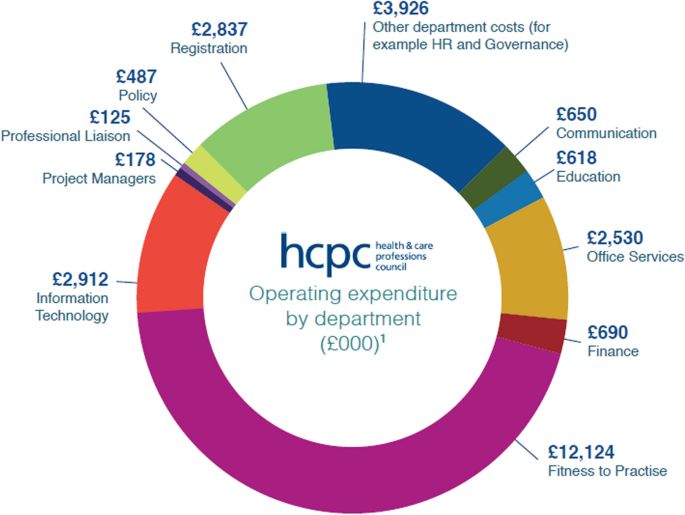
HCPC expenditure for the year 2020–21 [ 17 ]
There are other reports of poor experiences with this team [ 35 , 36 ], and in one report the FTP team’s processes have been noted as being rather inhumane [ 35 ].
Regulation is an important part of public protection, but how effectively it is managed & enforced is also a concern, given it involves increased scrutiny of registrants. A topical comparator is the current dissatisfaction by a large section of the public about several other government regulators allowing seemingly poor performance to go unchecked [ 4 , 5 ].
It is arguable, that registrants remain on the register as long as the HCPC allows them. Several respondents in this survey noted being removed from the register through HCPC administrative error. Removal could also happen through poor judgement/decision-making – the FTP team handle large numbers of very complex investigational cases – 1603 concluded cases for the year 2021–22 and 1024 hearings [ 16 ]. Every justice system is subject to a level of error – guilty parties can be erroneously ‘cleared’, and vice-versa. It is essential therefore, that policies & procedures relating to FTP are fit for purpose—that the FTP team work effectively and humanely, and that there is genuine & effective governance of HCPC to ensure accountability. In this survey, some respondents seem to be saying that currently this seems not to be the case.
It might have been anticipated that the greatest concern is costs, especially in the current cost-of-living crisis. The recent HCPC consultation to increase fees [ 37 ] seems particularly tone-deaf and has caused concern across the professions [ 21 , 22 ].
Above findings show respondents are interested in lower fees, but also increased benefit for their fees. Some respondents pointed out that whilst registrants pay for registration, benefit is mainly for the public and employers. The HCPC is a statutory body, its funding model will have been designed/decided upon by government, and may be unlikely to change. However, there are a variety of potential regulation models [ 38 ], and so change is possible. A review of the financial model for regulation may be welcome.
Regulator size
Some aspects of HCPC performance, policies, and distribution of spending, is related to the nature of it being the largest and only multi-professional regulator in the healthcare sector. Data from the HCPC suggests (see Fig. 5 ) that the majority of spending relates to FTP activity. Data also points to Clinical Scientists having very low levels of FTP investigation compared to others in HCPC [ 16 ]. This suggests that a significant proportion of CS registrant fees are used to investigate other professions. It’s possible (perhaps simplistically) that if, like many other healthcare professions such as doctors & dentists who’s regulator is concerned only with that single profession, if CSs were regulated separately, their registrant fees may be reduced. This model of single-profession regulation may also mitigate against other disadvantages of the HCPC’s practice, such as the ‘generic’ policies aiming to apply to a pool of 15 professions.
Although there is a very low level of data for this topic, the concerned raised by registrants are serious in nature. There also seems to be issues in handling of complaints related to this service and advocacy for registrants. Certainly, there is a clear governance path via PSA, to the Health Secretary. However, this does not offer a route for individual complaints to be raised and addressed. Unlike complaints from the public in other areas, there is no recourse to an ombudsman for registrants. The only option for individual registrants, is the submission of a formal complaint to the HCPC itself, which is dealt with internally. Comments from survey respondents suggest this process does not guarantee satisfaction. Indeed, one of the respondents who mentioned submitting a complaint, made it clear they remained unhappy with HCPC’s response. Overall, there seems to be a lack of clear & effective advocacy for registrants.
“…the HCPC’s stance appeared to be guilty until proven innocent… At no point did I feel the HCPC cared that their (sic) was an individual involved....” Resp044.
FTP processes affect a comparatively small number of CS registrants, compared to other professions. However, it seems clear that the majority of those who have interacted with the FTP team have had poor experiences, and respondents have suggested improvements are needed. The reason for FTP investigations, is protection of staff and the public. If processes are slow, and investigations prolonged, or decisions flawed, the public may be exposed to increased levels of risk, as healthcare practitioners who may be lacking in competence continue to practice. The data in Table 4 shows concerning but improving trends in FTP performance levels.
Limitations
There are two main limitations to this work. Firstly, due to time constraints, there was no pilot work done when designing the survey questionnaire. This may have helped, as noted earlier, a few responses pointed to some awkwardness with one survey question. Although no pilot work was done, the questionnaire was reviewed by the IPEM Professional Standards Committee, as noted in the Acknowledgements section.
The other obvious limitation is the low response rate (~ 6% of UK Medical Physicists). Circulation of the survey was performed via the only online forum for the profession currently available. The survey was advertised multiple times to ensure visibility to staff who may have missed it initially due to leave etc. However, the forum does reach 100% of the profession, and some addressees may have filters set to send specific posts to junk folders etc. The professional body IPEM declined to offer support in circulating the survey (believing the issues involved would affect/be of interest only to a small minority of members.)
The low response rate also has a particular impact on the pool of responses relating to FTP issues, which inherently affect low numbers of registrants.
However, the importance of some of the findings here (e.g. expressed dissatisfaction with regulation in terms of value; the poor experience of some members with the Registration, Communication and FTP teams) and the low sample surveyed, both justify the need for a larger follow-on survey, across all of Clinical Science.
In Healthcare, regulation of professions is a key aspect of protecting the public. However, to be effective, regulation must be performed professionally, impartially, and associated concerns or complaints investigated efficiently and respectfully.
This report presents findings from a survey aimed at collecting a snap-shot of the experiences of Clinical Scientists with their regulator, and their perception of the quality and safety of that regulation performance.
Overall survey sentiment scores showed a significantly more negative responses than positive. Survey comments relate not only to current issues, but to previous problems and controversial issues [ 18 , 26 ]. It seems that some respondents have at some point lost confidence and trust in the HCPC, and survey responses suggest there has not been enough engagement and work done by HCPC to repair and rebuild this trust.
In the midst of a cost of living crisis, costs are a large concern for many. The HCPC fees are neither the highest not lowest amongst the healthcare regulators. Spending is transparent, and details can be found in any of the HCPC’s annual reports.
A repeating sub-theme in responses, was a lack of tangible value for the registrant, and that the employer should pay the costs of registration, where registration is mandated by the job.
Many respondents have suggested that they feel there should be more proactive engagement from HCPC with the profession. Most respondents were not familiar with or felt the HCPC policies are relevant/important to them.
Survey data showed moderate satisfaction with registration processes for the majority of respondents. Some respondents also noted a lack of registration route for engineering & technical healthcare staff. CPD processes also achieved a score indicating registrant satisfaction. This generated the highest ratings in the survey. Communication scored poorly and many respondents suggests there needs to be improved levels of communication in terms of response times and access to support.
The CS profession experiences low levels of interaction with the FTP service. However, those interactions which were recorded in the survey, show some poor experiences for registrants. There also seems to be a lack of advocacy/route for complaints about HCPC from individual registrants. There may need to be more engagement between registrants and their professional body regarding HCPC performance, and more proactivity from the stake-holder, IPEM.
Some of the findings reported here relate to important issues, but the survey data are based on a low response rate. A larger survey across all of Clinical Science is being planned.
Availability of data and materials
To protect confidentiality of survey respondents, the source data is not available publicly, but are available from the author on reasonable request.
Abbreviations
Agenda for Change
Academy for Healthcare Clinical Scientists
Continuous professional development
Clinical Engineer
Clinical Scientist
College of Paramedics
Clinical Technologist
Freedom of Information
Fitness-to-practice
Health and Care Professions Council
Human resources
Institute of Physics and Engineering in Medicine
Joint Information Systems Committee
Medical Technical Officer
Professional Standards Authority
Professional Standards Committee
Qualitative data analysis
UK Medical Physics and Engineering
Professional Standards Authority. Professional healthcare regulation in the UK. https://www.professionalstandards.org.uk/news-and-blog/blog/detail/blog/2018/04/10/professional-healthcare-regulation-explained#:~:text=Regulation%20is%20simply%20a%20way,may%20face%20when%20receiving%20treatment . Accessed 26 Jul 2023
Evening Standard. Bogus surgeon treated hundreds. https://www.standard.co.uk/hp/front/bogus-surgeon-treated-hundreds-6326549.html . Accessed 26 Jul 2023.
HCPC . About registration: protected titles. http://www.hcpc-uk.org/aboutregistration/protectedtitles/ . Accessed 27 Jul 23.
The Guardian. Public patience is wearing thin. Ofwat must wield the big stick | Nils Pratley | https://www.theguardian.com/business/nils-pratley-on-finance/2022/dec/08/public-patience-is-wearing-thin-ofwat-must-wield-the-big-stick . Accessed 19 Jul 2023.
TrustPilot. Reviews of Ofgem. Ofgem Reviews | Read Customer Service Reviews of ofgem.com (trustpilot.com). Accessed 19 Jul 2023.
Braun V, Clarke V. Using thematic analysis in psychology. Qual Res Psychol. 2006;3(2):77–101.
Article Google Scholar
Kiger ME, Varpio L. Thematic analysis of qualitative data: AMEE Guide No. 131. Med Teach. 2020;42(8):846–54.
Article PubMed Google Scholar
Declaration of Helsinki. 2013. https://www.wma.net/policies-post/wma-declaration-of-helsinki-ethical-principles-for-medical-research-involving-human-subjects/ . Accessed 12 Sept 2023.
UK Data Protection Act. 2018. https://www.gov.uk/data-protection . Accessed 15 Sept 2023.
Rowbottom C. Private communication on behalf of the IPEM Professional Standards Committee; 2022.
IPEM Workforce Team. Clinical scientist & engineer workforce data. Personal communication. 2022.
Unison. HCPC fee increase is an unjustified ‘tax on practising.’ https://www.unison.org.uk/news/press-release/2019/02/hcpc-fee-increase-unjustified-tax-practising/ . Accessed 27 Jul 2023.
HCPC. Direct debit collection errors. https://www.hcpc-uk.org/news-and-events/news/2020/early-direct-debit-collections/?dm_i=2NJF,141CO,7C0ZNI,4A8IE,1 . Accessed 27 Jul 23.
HCPC. CPD audit rates. https://www.hcpc-uk.org/cpd/cpd-audits/ . Accessed 21 Jul 2023.
IPEM. CPD audit rates. https://www.ipem.ac.uk/your-career/cpd-career-development/cpd-audit/ . Accessed 21 Jul 2023.
HCPC. Fitness to practice annual report 2020–21. https://www.hcpc-uk.org/about-us/insights-and-data/ftp/fitness-to-practise-annual-report-2020-21/ . Accessed 23 Jul 2023.
HCPC. Annual report and accounts, 2020–21. https://www.hcpc-uk.org/resources/reports/2022/annual-report-and-accounts-2020-21/ . Accessed 19 Jul 2023.
Wikipedia. The health and care professions council. https://en.wikipedia.org/wiki/Health_and_Care_Professions_Council . Accessed 2 Jul 23.
HCPC. Annual report 2005–06. https://www.hcpc-uk.org/resources/reports/2006/annual-report-2005-06/ . Accessed 19 Jul 2023.
British Dental Association. BDA very disappointed by HCPC decision to raise registration fees by 18%. https://www.bda.uk.com/resource/bda-very-disappointed-by-hcpc-decision-to-raise-registration-fees-by-18.html . Accessed 27 Jul 2023.
British Psychological Society. HCPC fees consultation – share your views. https://www.bps.org.uk/news/hcpc-fee-consultation-share-your-views . Accessed 27 Jul 23.
IBMS. IBMS response to the HCPC registration fees consultation. https://www.ibms.org/resources/news/ibms-response-to-hcpc-registration-fees-consultation/ . Accessed 17 Jul 23.
Association of HealthCare Scientists. Open letter to HCPC. https://www.ahcs.ac.uk/wp-content/uploads/2018/11/HCPC-Open-Letter.pdf . Accessed 27 Jul 23.
HCPC. Corporate plan 2022–23. https://www.hcpc-uk.org/resources/reports/2022/hcpc-corporate-plan-2022-23/ . Accessed 23 Jul 2023.
College of Paramedics. Our formal response to the HCPC consultation. https://collegeofparamedics.co.uk/COP/News/2023/Our%20formal%20response%20to%20the%20HCPC%20consultation.aspx . Accessed 27 Jul 23.
JISC Mail - MPE mailbase. JISCMail - Medical-physics-engineering list at www.jiscmail.ac.uk . Accessed 19 July 2023.
The Guardian. Thousands miss out on treatment as physiotherapists are taken off UK register. https://www.theguardian.com/society/2022/may/14/thousands-miss-out-on-treatment-as-physiotherapists-are-struck-off-uk-register . Accessed 27 Jul 2023.
HSJJobs.com. https://www.hsjjobs.com/article/thousands-of-clinicians-unable-to-work-after-registration-blunder . Accessed 27 Jul 2023.
HCPC. How we investigate. https://www.hcpc-uk.org/concerns/how-we-investigate/ . Accessed 21 Nov 2023.
Sirriyeh R, Lawton R, Gardner P, Armitage G. Coping with medical error: a systematic review of papers to assess the effects of involvement in medical errors on healthcare professionals’ psychological well-being. Br Med J Qual Saf. 2010;19:6.
Google Scholar
Bourne T, Wynants L, Peters M, van Audenhove C, Timmerman D, van Calster B, et al. The impact of complaints procedures on the welfare, health and clinical practise of 7926 doctors in the UK: a cross-sectional survey. BMJ Open. 2015;5:e006687.
Article PubMed PubMed Central Google Scholar
Jones-Berry S. Suicide risk for nurses during fitness to practice process. Ment Health Pract. 2016;19:8.
Professional Standards Authority. HCPC performance review 2022–23. https://www.professionalstandards.org.uk/publications/performance-review-detail/periodic-review-hcpc-2022-23 . Accessed 25 Jul 2023
HCPC. Annual report and accounts, 2018–19. https://www.hcpc-uk.org/resources/reports/2019/hcpc-annual-report-and-accounts-2018-19/ . Accessed 19 Jul 2023.
Maben J, Hoinville L, Querstret D, Taylor C, Zasada M, Abrams R. Living life in limbo: experiences of healthcare professionals during the HCPC fitness to practice investigation process in the UK. BMC Health Serv Res. 2021;21:839–54.
Leigh J, Worsley A, Richard C, McLaughlin K. An analysis of HCPC fitness to practise hearings: fit to practise or fit for purpose? Ethics Soc Welfare. 2017;11(4):382–96.
HCPC. Consultation changes to fees. https://www.hcpc-uk.org/news-and-events/consultations/2022/consultation-on-changes-to-fees/ . Accessed 27 Jul 23
Department of Health. Review of the regulation of public health professions. London: DoH; 2010.
Download references
Acknowledgements
The author wishes to kindly acknowledge the input of Dr Carl Rowbottom (IPEM Professional Standards Committee), in reviewing the survey questions. Thanks also to Dr Nina Cockton for helpful advice on ethics and recruitment issues.
There were no sources of funding required for this work.
Author information
Authors and affiliations.
University of Glasgow, Level 2, ICE Building, Queen Elizabeth University Hospital Campus, 1345 Govan Road, Glasgow, G51 4TF, UK
Mark McJury
You can also search for this author in PubMed Google Scholar
Contributions
All work to collect, analyse & publish this survey, are the work of the author Dr Mark McJury.
Corresponding author
Correspondence to Mark McJury .
Ethics declarations
Ethics approval and consent to participate.
As this study relates to low risk, survey data, formal ethics committee approval is not required (exemption obtained from NHSGGC REC04 REC Officer Dr Judith Godden [email protected]). As the survey responses were from members of a professional body (The Institute of Medical Physics and Engineering in Medicine (IPEM) it was consulted. Its Professional Standards Committee (PSC) reviewed the survey and raised no objections. The survey questions were assessed for bias and approved unchanged (acknowledged in the manuscript). Written informed consent was obtained from all participants in the study.
Consent for publication
Not applicable.
Competing interests
The authors declare no competing interests.
Additional information
Publisher’s note.
Springer Nature remains neutral with regard to jurisdictional claims in published maps and institutional affiliations.
Supplementary Information
Additional file 1..
The survey questionnaire has been provided as a supplementary file.
Rights and permissions
Open Access This article is licensed under a Creative Commons Attribution 4.0 International License, which permits use, sharing, adaptation, distribution and reproduction in any medium or format, as long as you give appropriate credit to the original author(s) and the source, provide a link to the Creative Commons licence, and indicate if changes were made. The images or other third party material in this article are included in the article's Creative Commons licence, unless indicated otherwise in a credit line to the material. If material is not included in the article's Creative Commons licence and your intended use is not permitted by statutory regulation or exceeds the permitted use, you will need to obtain permission directly from the copyright holder. To view a copy of this licence, visit http://creativecommons.org/licenses/by/4.0/ . The Creative Commons Public Domain Dedication waiver ( http://creativecommons.org/publicdomain/zero/1.0/ ) applies to the data made available in this article, unless otherwise stated in a credit line to the data.
Reprints and permissions
About this article
Cite this article.
McJury, M. Experiences of UK clinical scientists (Physical Sciences modality) with their regulator, the Health and Care Professions Council: results of a 2022 survey. BMC Health Serv Res 24 , 635 (2024). https://doi.org/10.1186/s12913-024-10956-7
Download citation
Received : 06 September 2023
Accepted : 05 April 2024
Published : 16 May 2024
DOI : https://doi.org/10.1186/s12913-024-10956-7
Share this article
Anyone you share the following link with will be able to read this content:
Sorry, a shareable link is not currently available for this article.
Provided by the Springer Nature SharedIt content-sharing initiative
- Regulation of professions
- Clinical scientists
- Medical physicists
BMC Health Services Research
ISSN: 1472-6963
- General enquiries: [email protected]
MIT Technology Review
- Newsletters
A wave of retractions is shaking physics
Grappling with problematic papers and poorly documented data, researchers and journal editors gathered in Pittsburgh to hash out the best way forward.
- Sophia Chen archive page
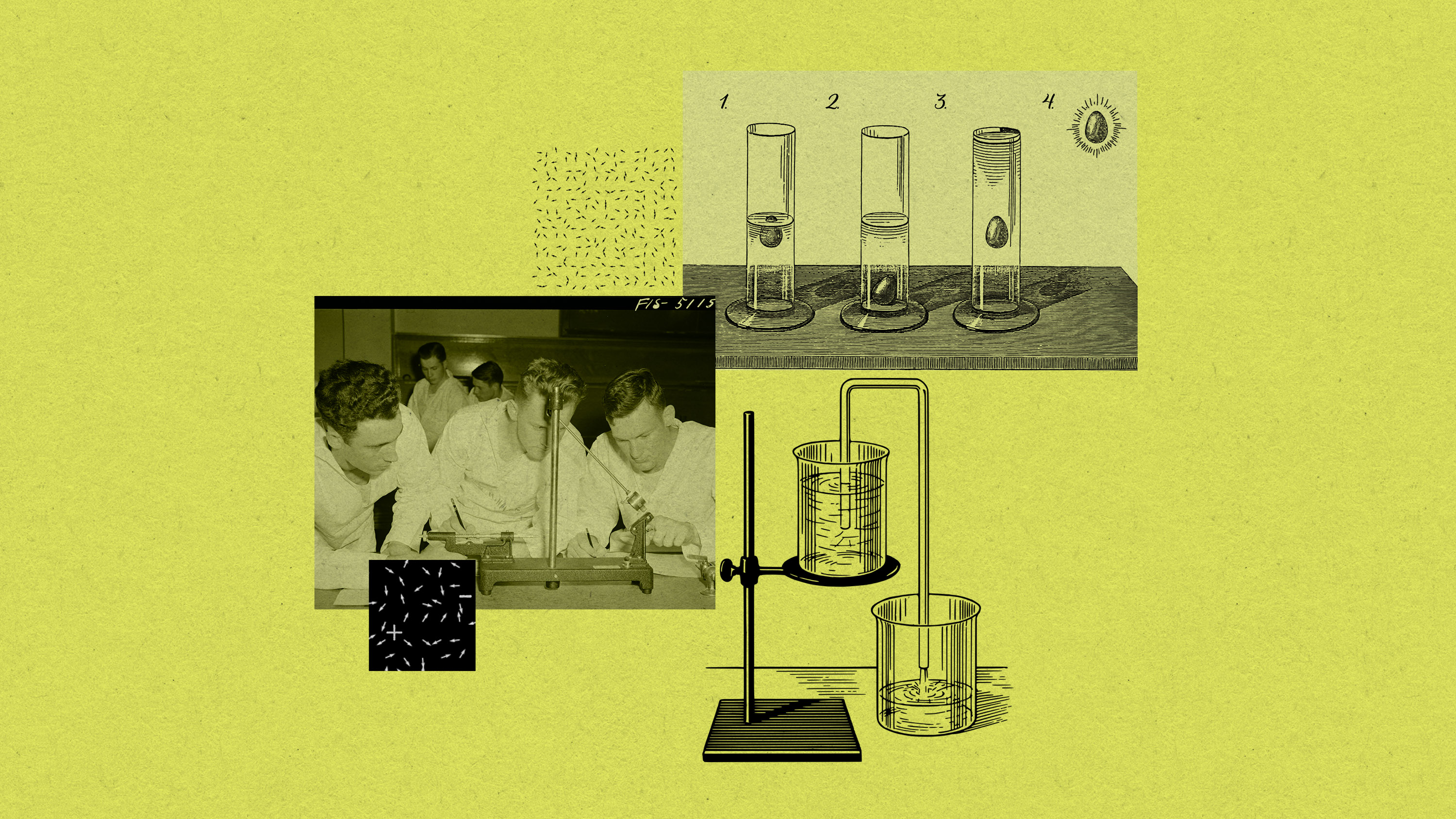
Recent highly publicized scandals have gotten the physics community worried about its reputation—and its future. Over the last five years, several claims of major breakthroughs in quantum computing and superconducting research, published in prestigious journals, have disintegrated as other researchers found they could not reproduce the blockbuster results.
Last week, around 50 physicists, scientific journal editors, and emissaries from the National Science Foundation gathered at the University of Pittsburgh to discuss the best way forward.“To be honest, we’ve let it go a little too long,” says physicist Sergey Frolov of the University of Pittsburgh, one of the conference organizers.
The attendees gathered in the wake of retractions from two prominent research teams. One team, led by physicist Ranga Dias of the University of Rochester, claimed that it had invented the world’s first room temperature superconductor in a 2023 paper in Nature . After independent researchers reviewed the work, a subsequent investigation from Dias’s university found that he had fabricated and falsified his data. Nature retracted the paper in November 2023. Last year, Physical Review Letters retracted a 2021 publication on unusual properties in manganese sulfide that Dias co-authored.
The other high-profile research team consisted of researchers affiliated with Microsoft working to build a quantum computer. In 2021, Nature retracted the team’s 2018 paper that claimed the creation of a pattern of electrons known as a Majorana particle, a long-sought breakthrough in quantum computing. Independent investigations of that research found that the researchers had cherry-picked their data, thus invalidating their findings. Another less-publicized research team pursuing Majorana particles fell to a similar fate, with Science retracting a 2017 article claiming indirect evidence of the particles in 2022.
In today’s scientific enterprise, scientists perform research and submit the work to editors. The editors assign anonymous referees to review the work, and if the paper passes review, the work becomes part of the accepted scientific record. When researchers do publish bad results, it’s not clear who should be held accountable—the referees who approved the work for publication, the journal editors who published it, or the researchers themselves. “Right now everyone’s kind of throwing the hot potato around,” says materials scientist Rachel Kurchin of Carnegie Mellon University, who attended the Pittsburgh meeting.
Much of the three-day meeting, named the International Conference on Reproducibility in Condensed Matter Physics (a field that encompasses research into various states of matter and why they exhibit certain properties), focused on the basic scientific principle that an experiment and its analysis must yield the same results when repeated. “If you think of research as a product that is paid for by the taxpayer, then reproducibility is the quality assurance department,” Frolov told MIT Technology Review . Reproducibility offers scientists a check on their work, and without it, researchers might waste time and money on fruitless projects based on unreliable prior results, he says.
In addition to presentations and panel discussions, there was a workshop during which participants split into groups and drafted ideas for guidelines that researchers, journals, and funding agencies could follow to prioritize reproducibility in science. The tone of the proceedings stayed civil and even lighthearted at times. Physicist Vincent Mourik of Forschungszentrum Jülich, a German research institution, showed a photo of a toddler eating spaghetti to illustrate his experience investigating another team’s now-retracted experiment. Occasionally the discussion almost sounded like a couples counseling session, with NSF program director Tomasz Durakiewicz asking a panel of journal editors and a researcher to reflect on their “intimate bond based on trust.”
But researchers did not shy from directly criticizing Nature , Science , and the Physical Review family of journals, all of which sent editors to attend the conference. During a panel, physicist Henry Legg of the University of Basel in Switzerland called out the journal Physical Review B for publishing a paper on a quantum computing device by Microsoft researchers that, for intellectual-property reasons, omitted information required for reproducibility. “It does seem like a step backwards,” Legg said. (Sitting in the audience, Physical Review B editor Victor Vakaryuk said that the paper’s authors had agreed to release “the remaining device parameters” by the end of the year.)
Journals also tend to “focus on story,” said Legg, which can lead editors to be biased toward experimental results that match theoretical predictions. Jessica Thomas, the executive editor of the American Physical Society, which publishes the Physical Review journals, pushed back on Legg’s assertion. “I don’t think that when editors read papers, they’re thinking about a press release or [telling] an amazing story,” Thomas told MIT Technology Review . “I think they’re looking for really good science.” Describing science through narrative is a necessary part of communication, she says. “We feel a responsibility that science serves humanity, and if humanity can’t understand what’s in our journals, then we have a problem.”
Frolov, whose independent review with Mourik of the Microsoft work spurred its retraction, said he and Mourik have had to repeatedly e-mail the Microsoft researchers and other involved parties to insist on data. “You have to learn how to be an asshole,” he told MIT Technology Review . “It shouldn’t be this hard.”
At the meeting, editors pointed out that mistakes, misconduct, and retractions have always been a part of science in practice. “I don’t think that things are worse now than they have been in the past,” says Karl Ziemelis, an editor at Nature .
Ziemelis also emphasized that “retractions are not always bad.” While some retractions occur because of research misconduct, “some retractions are of a much more innocent variety—the authors having made or being informed of an honest mistake, and upon reflection, feel they can no longer stand behind the claims of the paper,” he said while speaking on a panel. Indeed, physicist James Hamlin of the University of Florida, one of the presenters and an independent reviewer of Dias’s work, discussed how he had willingly retracted a 2009 experiment published in Physical Review Letters in 2021 after another researcher’s skepticism prompted him to reanalyze the data.
What’s new is that “the ease of sharing data has enabled scrutiny to a larger extent than existed before,” says Jelena Stajic, an editor at Science . Journals and researchers need a “more standardized approach to how papers should be written and what needs to be shared in peer review and publication,” she says.
Focusing on the scandals “can be distracting” from systemic problems in reproducibility, says attendee Frank Marsiglio, a physicist at the University of Alberta in Canada. Researchers aren’t required to make unprocessed data readily available for outside scrutiny. When Marsiglio has revisited his own published work from a few years ago, sometimes he’s had trouble recalling how his former self drew those conclusions because he didn’t leave enough documentation. “How is somebody who didn’t write the paper going to be able to understand it?” he says.
Problems can arise when researchers get too excited about their own ideas. “What gets the most attention are cases of fraud or data manipulation, like someone copying and pasting data or editing it by hand,” says conference organizer Brian Skinner, a physicist at Ohio State University. “But I think the much more subtle issue is there are cool ideas that the community wants to confirm, and then we find ways to confirm those things.”
But some researchers may publish bad data for a more straightforward reason. The academic culture, popularly described as “publish or perish,” creates an intense pressure on researchers to deliver results. “It’s not a mystery or pathology why somebody who’s under pressure in their work might misstate things to their supervisor,” said Eugenie Reich, a lawyer who represents scientific whistleblowers, during her talk.
Notably, the conference lacked perspectives from researchers based outside the US, Canada, and Europe, and from researchers at companies. In recent years, academics have flocked to companies such as Google, Microsoft, and smaller startups to do quantum computing research, and they have published their work in Nature , Science , and the Physical Review journals. Frolov says he reached out to researchers from a couple of companies, but “that didn’t work out just because of timing,” he says. He aims to include researchers from that arena in future conversations.
After discussing the problems in the field, conference participants proposed feasible solutions for sharing data to improve reproducibility. They discussed how to persuade the community to view data sharing positively, rather than seeing the demand for it as a sign of distrust. They also brought up the practical challenges of asking graduate students to do even more work by preparing their data for outside scrutiny when it may already take them over five years to complete their degree. Meeting participants aim to publicly release a paper with their suggestions. “I think trust in science will ultimately go up if we establish a robust culture of shareable, reproducible, replicable results,” says Frolov.
Deepfakes of your dead loved ones are a booming Chinese business
People are seeking help from AI-generated avatars to process their grief after a family member passes away.
- Zeyi Yang archive page
Technology is probably changing us for the worse—or so we always think
For nearly a hundred years in this publication (and long before that elsewhere) people have worried that new technologies could alter what it means to be human.
- Timothy Maher archive page
Why Threads is suddenly popular in Taiwan
During Taiwan’s presidential election, Meta’s social network emerged as a surprise hit.
Threads is giving Taiwanese users a safe space to talk about politics
But Meta's discomfort with political content could end up pushing them away.
Stay connected
Get the latest updates from mit technology review.
Discover special offers, top stories, upcoming events, and more.
Thank you for submitting your email!
It looks like something went wrong.
We’re having trouble saving your preferences. Try refreshing this page and updating them one more time. If you continue to get this message, reach out to us at [email protected] with a list of newsletters you’d like to receive.
- MyU : For Students, Faculty, and Staff
CS&E Announces 2024-25 Doctoral Dissertation Fellowship (DDF) Award Winners
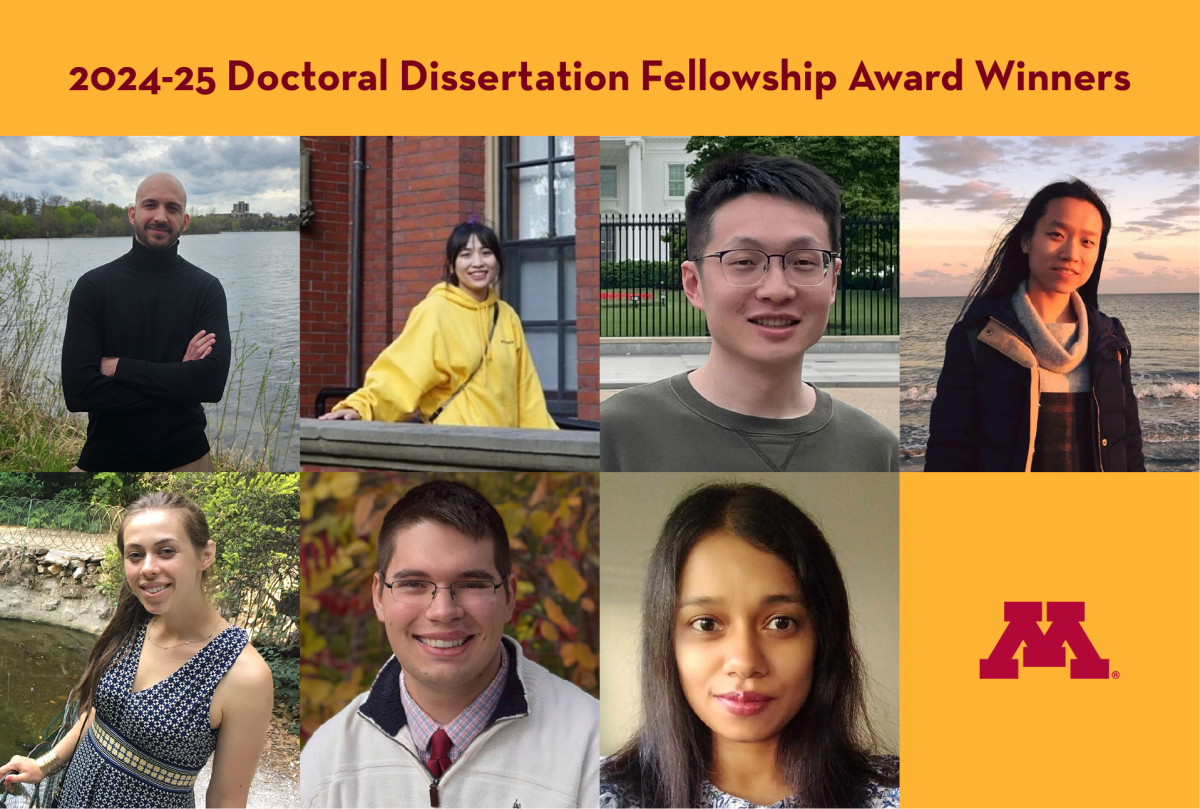
Seven Ph.D. students working with CS&E professors have been named Doctoral Dissertation Fellows for the 2024-25 school year. The Doctoral Dissertation Fellowship is a highly competitive fellowship that gives the University’s most accomplished Ph.D. candidates an opportunity to devote full-time effort to an outstanding research project by providing time to finalize and write a dissertation during the fellowship year. The award includes a stipend of $25,000, tuition for up to 14 thesis credits each semester, and subsidized health insurance through the Graduate Assistant Health Plan.
CS&E congratulates the following students on this outstanding accomplishment:
- Athanasios Bacharis (Advisor: Nikolaos Papanikolopoulos )
- Karin de Langis (Advisor: Dongyeop Kang )
- Arshia Zernab Hassan (Advisors: Chad Myers )
- Xinyue Hu (Advisors: Zhi-Li Zhang )
- Lucas Kramer (Advisors: Eric Van Wyk )
- Yijun Lin (Advisors: Yao-Yi Chiang )
- Mingzhou Yang (Advisors: Shashi Shekhar )
Athanasios Bacharis
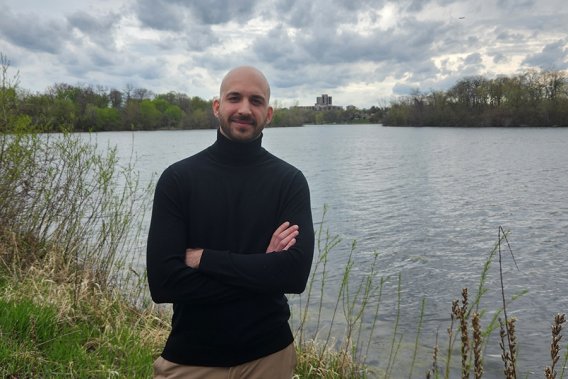
Bacharis’ work centers around the robot-vision area, focusing on making autonomous robots act on visual information. His research includes active vision approaches, namely, view planning and next-best-view, to tackle the problem of 3D reconstruction via different optimization frameworks. The acquisition of 3D information is crucial for automating tasks, and active vision methods obtain it via optimal inference. Areas of impact include agriculture and healthcare, where 3D models can lead to reduced use of fertilizers via phenotype analysis of crops and effective management of cancer treatments. Bacharis has a strong publication record, with two peer-reviewed conference papers and one journal paper already published. He also has one conference paper under review and two journal papers in the submission process. His publications are featured in prestigious robotic and automation venues, further demonstrating his expertise and the relevance of his research in the field.
Karin de Langis
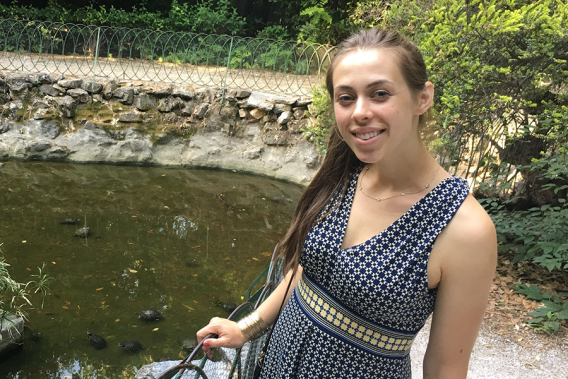
Karin's thesis works at the intersection of Natural Language Processing (NLP) and cognitive science. Her work uses eye-tracking and other cognitive signals to improve NLP systems in their performance and cognitive interpretability, and to create NLP systems that process language more similarly to humans. Her human-centric approach to NLP is motivated by the possibility of addressing the shortcomings of current statistics-based NLP systems, which often become stuck on explainability and interpretability, resulting in potential biases. This work has most recently been accepted and presented at SIGNLL Conference on Computational Natural Language Learning (CoNLL) conference which has a special focus on theoretically, cognitively and scientifically motivated approaches to computational linguistics.
Arshia Zernab Hassan
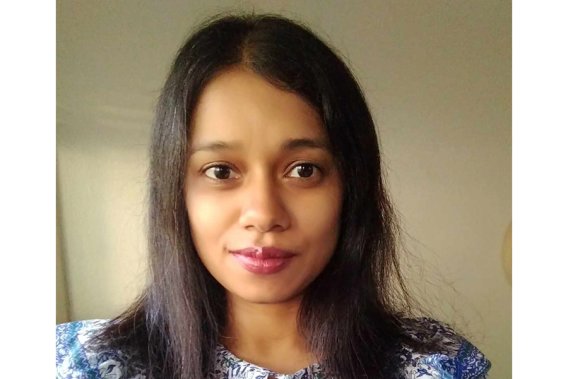
Hassan's thesis work delves into developing computational methods for interpreting data from genome wide CRISPR/Cas9 screens. CRISPR/Cas9 is a new approach for genome editing that enables precise, large-scale editing of genomes and construction of mutants in human cells. These are powerful data for inferring functional relationships among genes essential for cancer growth. Moreover, chemical-genetic CRISPR screens, where population of mutant cells are grown in the presence of chemical compounds, help us understand the effect the chemicals have on cancer cells and formulate precise drug solutions. Given the novelty of these experimental technologies, computational methods to process and interpret the resulting data and accurately quantify the various genetic interactions are still quite limited, and this is where Hassan’s dissertation is focused on. Her research extends to developing deep-learning based methods that leverage CRISPR chemical-genetic and other genomic datasets to predict cancer sensitivity to candidate drugs. Her methods on improving information content in CRISPR screens was published in the Molecular Systems Biology journal, a highly visible journal in the computational biology field.

Hu's Ph.D. dissertation is concentrated on how to effectively leverage the power of artificial intelligence and machine learning (AI/ML) – especially deep learning – to tackle challenging and important problems in the design and development of reliable, effective and secure (independent) physical infrastructure networks. More specifically, her research focuses on two critical infrastructures: power grids and communication networks, in particular, emerging 5G networks, both of which not only play a critical role in our daily life but are also vital to the nation’s economic well-being and security. Due to the enormous complexity, diversity, and scale of these two infrastructures, traditional approaches based on (simplified) theoretical models and heuristics-based optimization are no longer sufficient in overcoming many technical challenges in the design and operations of these infrastructures: data-driven machine learning approaches have become increasingly essential. The key question now is: how does one leverage the power of AI/ML without abandoning the rich theory and practical expertise that have accumulated over the years? Hu’s research has pioneered a new paradigm – (domain) knowledge-guided machine learning (KGML) – in tackling challenging and important problems in power grid and communications (e.g., 5G) network infrastructures.
Lucas Kramer

Kramer is now the driving force in designing tools and techniques for building extensible programming languages, with the Minnesota Extensible Language Tools (MELT) group. These are languages that start with a host language such as C or Java, but can then be extended with new syntax (notations) and new semantics (e.g. error-checking analyses or optimizations) over that new syntax and the original host language syntax. One extension that Kramer created was to embed the domain-specific language Halide in MELT's extensible specification of C, called ableC. This extension allows programmers to specify how code working on multi-dimensional matrices is transformed and optimized to make efficient use of hardware. Another embeds the logic-programming language Prolog into ableC; yet another provides a form of nondeterministic parallelism useful in some algorithms that search for a solution in a structured, but very large, search space. The goal of his research is to make building language extensions such as these more practical for non-expert developers. To this end he has made many significant contributions to the MELT group's Silver meta-language, making it easier for extension developers to correctly specify complex language features with minimal boilerplate. Kramer is the lead author of one journal and four conference papers on his work at the University of Minnesota, winning the distinguished paper award for his 2020 paper at the Software Language Engineering conference, "Strategic Tree Rewriting in Attribute Grammars".

Lin’s doctoral dissertation focuses on a timely, important topic of spatiotemporal prediction and forecasting using multimodal and multiscale data. Spatiotemporal prediction and forecasting are important scientific problems applicable to diverse phenomena, such as air quality, ambient noise, traffic conditions, and meteorology. Her work also couples the resulting prediction and forecasting with multimodal (e.g., satellite imagery, street-view photos, census records, and human mobility data) and multiscale geographic information (e.g., census records focusing on small tracts vs. neighborhood surveys) to characterize the natural and built environment, facilitating our understanding of the interactions between and within human social systems and the ecosystem. Her work has a wide-reaching impact across multiple domains such as smart cities, urban planning, policymaking, and public health.
Mingzhou Yang
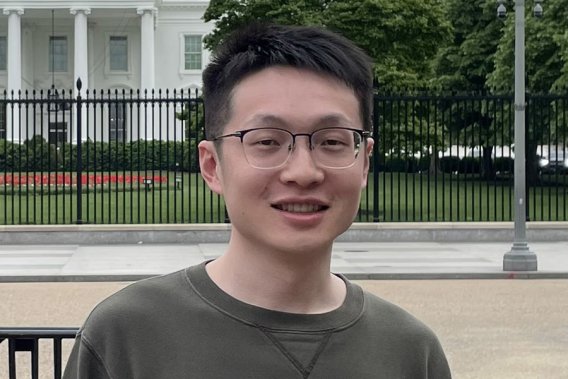
Yang is developing a thesis in the broad area of spatial data mining for problems in transportation. His thesis has both societal and theoretical significance. Societally, climate change is a grand challenge due to the increasing severity and frequency of climate-related disasters such as wildfires, floods, droughts, etc. Thus, many nations are aiming at carbon neutrality (also called net zero) by mid-century to avert the worst impacts of global warming. Improving energy efficiency and reducing toxic emissions in transportation is important because transportation accounts for the vast majority of U.S. petroleum consumption as well as over a third of GHG emissions and over a hundred thousand U.S. deaths annually via air pollution. To accurately quantify the expected environmental cost of vehicles during real-world driving, Yang's thesis explores ways to incorporate physics in the neural network architecture complementing other methods of integration: feature incorporation, and regularization. This approach imposes stringent physical constraints on the neural network model, guaranteeing that its outputs are consistently in accordance with established physical laws for vehicles. Extensive experiments including ablation studies demonstrated the efficacy of incorporating physics into the model.
Related news releases
- Brock Shamblin Wins 2024 Riedl TA Award
- Ph.D. Student Angel Sylvester Mentor’s High School Student
- 2024 John T. Riedl Memorial Graduate Teaching Assistant Award
- CS&E Earns Five Awards at 2023 SIAM SDM
- CS&E Announces 2023-24 Doctoral Dissertation Fellowship (DDF) Award Winners
- Future undergraduate students
- Future transfer students
- Future graduate students
- Future international students
- Diversity and Inclusion Opportunities
- Learn abroad
- Living Learning Communities
- Mentor programs
- Programs for women
- Student groups
- Visit, Apply & Next Steps
- Information for current students
- Departments and majors overview
- Departments
- Undergraduate majors
- Graduate programs
- Integrated Degree Programs
- Additional degree-granting programs
- Online learning
- Academic Advising overview
- Academic Advising FAQ
- Academic Advising Blog
- Appointments and drop-ins
- Academic support
- Commencement
- Four-year plans
- Honors advising
- Policies, procedures, and forms
- Career Services overview
- Resumes and cover letters
- Jobs and internships
- Interviews and job offers
- CSE Career Fair
- Major and career exploration
- Graduate school
- Collegiate Life overview
- Scholarships
- Diversity & Inclusivity Alliance
- Anderson Student Innovation Labs
- Information for alumni
- Get engaged with CSE
- Upcoming events
- CSE Alumni Society Board
- Alumni volunteer interest form
- Golden Medallion Society Reunion
- 50-Year Reunion
- Alumni honors and awards
- Outstanding Achievement
- Alumni Service
- Distinguished Leadership
- Honorary Doctorate Degrees
- Nobel Laureates
- Alumni resources
- Alumni career resources
- Alumni news outlets
- CSE branded clothing
- International alumni resources
- Inventing Tomorrow magazine
- Update your info
- CSE giving overview
- Why give to CSE?
- College priorities
- Give online now
- External relations
- Giving priorities
- CSE Dean's Club
- Donor stories
- Impact of giving
- Ways to give to CSE
- Matching gifts
- CSE directories
- Invest in your company and the future
- Recruit our students
- Connect with researchers
- K-12 initiatives
- Diversity initiatives
- Research news
- Give to CSE
- CSE priorities
- Corporate relations
- Information for faculty and staff
- Administrative offices overview
- Office of the Dean
- Academic affairs
- Finance and Operations
- Communications
- Human resources
- Undergraduate programs and student services
- CSE Committees
- CSE policies overview
- Academic policies
- Faculty hiring and tenure policies
- Finance policies and information
- Graduate education policies
- Human resources policies
- Research policies
- Research overview
- Research centers and facilities
- Research proposal submission process
- Research safety
- Award-winning CSE faculty
- National academies
- University awards
- Honorary professorships
- Collegiate awards
- Other CSE honors and awards
- Staff awards
- Performance Management Process
- Work. With Flexibility in CSE
- K-12 outreach overview
- Summer camps
- Outreach events
- Enrichment programs
- Field trips and tours
- CSE K-12 Virtual Classroom Resources
- Educator development
- Sponsor an event
Frontiers | Science News
- Science News
Research Topics
Five research topics exploring the science of mental health.

Mental wellbeing is increasingly recognized as an essential aspect of our overall health. It supports our ability to handle challenges, build strong relationships, and live more fulfilling lives. The World Health Organization (WHO) emphasizes the importance of mental health by acknowledging it as a fundamental human right.
This Mental Health Awareness Week, we highlight the remarkable work of scientists driving open research that helps everyone achieve better mental health.
Here are five Research Topics that study themes including how we adapt to a changing world, the impact of loneliness on our wellbeing, and the connection between our diet and mental health.
All articles are openly available to view and download.
1 | Community Series in Mental Health Promotion and Protection, volume II
40.300 views | 16 articles
There is no health without mental health. Thus, this Research Topic collects ideas and research related to strategies that promote mental health across all disciplines. The goal is to raise awareness about mental health promotion and protection to ensure its incorporation in national mental health policies.
This topic is of relevance given the mental health crisis being experienced across the world right now. A reality that has prompted the WHO to declare that health is a state of complete physical, mental, and social wellbeing.
View Research Topic
2 | Dietary and Metabolic Approaches for Mental Health Conditions
176.800 views | 11 articles
There is increased recognition that mental health disorders are, at least in part, a form of diet-related disease. For this reason, we focus attention on a Research Topic that examines the mechanistic interplay between dietary patterns and mental health conditions.
There is a clear consensus that the quality, quantity, and even timing of our human feeding patterns directly impact how brains function. But despite the epidemiological and mechanistic links between mental health and diet-related diseases, these two are often perceived as separate medical issues.
Even more urgent, public health messaging and clinical treatments for mental health conditions place relatively little emphasis on formulating nutrition to ease the underlying drivers of mental health conditions.
3 | Comparing Mental Health Cross-Culturally
94.000 views | 15 articles
Although mental health has been widely discussed in later years, how mental health is perceived across different cultures remains to be examined. This Research Topic addresses this gap and deepens our knowledge of mental health by comparing positive and negative psychological constructs cross-culturally.
The definition and understanding of mental health remain to be refined, partially because of a lack of cross-cultural perspectives on mental health. Also, due to the rapid internationalization taking place in the world today, a culturally aware understanding of, and interventions for mental health problems are essential.
4 | Adaption to Change and Coping Strategies: New Resources for Mental Health
85.000 views | 29 articles
In this Research Topic, scientists study a wider range of variables involved in change and adaptation. They examine changes of any type or magnitude whenever the lack of adaptive response diminishes our development and well-being.
Today’s society is characterized by change, and sometimes, the constant changes are difficult to assimilate. This may be why feelings of frustration and defenselessness appear in the face of the impossibility of responding adequately to the requirements of a changing society.
Therefore, society must develop an updated notion of the processes inherent to changing developmental environments, personal skills, resources, and strategies. This know-how is crucial for achieving and maintaining balanced mental health.
5 | Mental Health Equity
29.900 views | 10 articles
The goal of this Research Topic is to move beyond a synthesis of what is already known about mental health in the context of health equity. Rather, the focus here is on transformative solutions, recommendations, and applied research that have real world implications on policy, practice, and future scholarship.
Attention in the field to upstream factors and the role of social and structural determinants of health in influencing health outcomes, combined with an influx of innovation –particularly the digitalization of healthcare—presents a unique opportunity to solve pressing issues in mental health through a health equity lens.
The topic is opportune because factors such as structural racism and climate change have disproportionately negatively impacted marginalized communities across the world, including Black, Indigenous, People of Color (BIPOC), LGBTQ+, people with disabilities, and transition-age youth and young adults. As a result, existing disparities in mental health have exacerbated.
Post related info
May 13, 2024
Frontiers Science Communications
Post categories, featured news, related subjects, research topics, related content.

Opening health for all: 7 Research Topics shaping a healthier world

Frontiers' Research Topic publishing program: pioneering the future of scientific publishing

Frontiers institutional partnerships update – winter 2024
Latest posts.

Screen time not the main factor making parent-child interactions worse, study finds

A devastating fire 2,200 years ago preserved a moment of life and war in Iron Age Spain — right down to a single gold earring

Frontiers institutional partnerships update – spring 2024

Mariana Fuentes - Changing the currency of conservation

A .gov website belongs to an official government organization in the United States.
A lock ( ) or https:// means you've safely connected to the .gov website. Share sensitive information only on official, secure websites.
- About Mild TBI and Concussion
- After a Mild TBI or Concussion
- Health Disparities in TBI
- Comparing Head Impacts
- Clinical Guidance
- Mild Traumatic Brain Injury Management Guideline
- Resources for Health Care Providers
Traumatic Brain Injury & Concussion
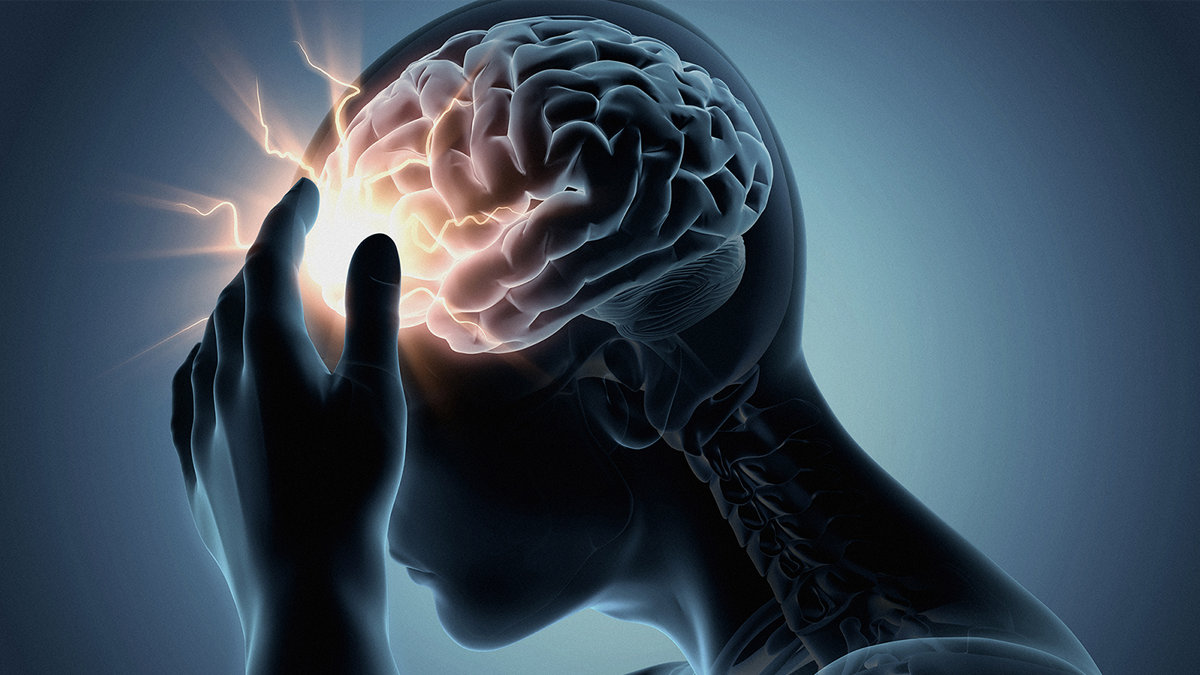
About Moderate and Severe TBI

Preventing TBI
Symptoms of Mild TBI and Concussion

Where to Get Help

Facts About TBI
For Medical Professionals

Clinical Guidance for Pediatric mTBI
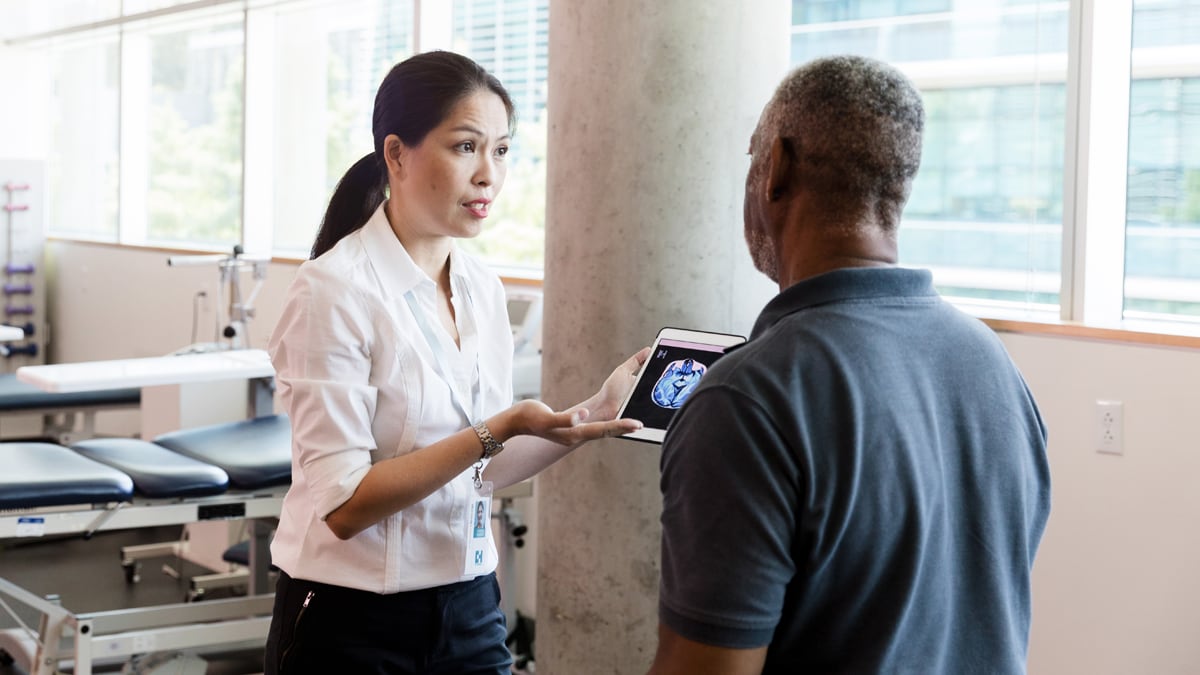
Health Care Provider Resources
CDC Programs
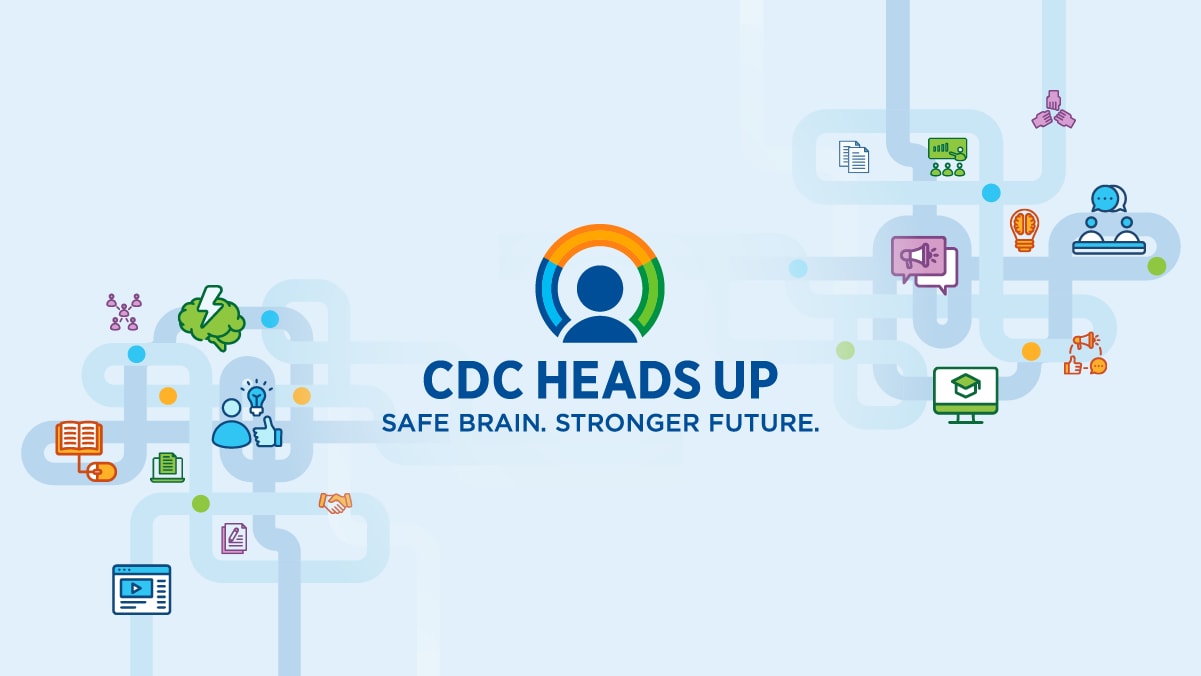
HEADS UP Online Training Courses
National Concussion Surveillance System
Core State Injury Prevention Program (Core SIPP)
A traumatic brain injury, or TBI, is an injury that affects how the brain works. TBI is a major cause of death and disability in the United States.
For Everyone
Health care providers.

IMAGES
VIDEO
COMMENTS
199+ Physical Science Research Topics [Updated 2024] General / By Stat Analytica / 15th November 2023. Physical science, a branch of natural science, delves into the fundamental principles that govern the physical world around us. From the microscopic world of atoms and molecules to the vast expanse of the cosmos, physical science encompasses a ...
Physics Research Topics for Grade 9. Investigating the properties of waves: amplitude, frequency, wavelength, and speed. The effect of temperature on the expansion and contraction of materials. The relationship between mass, velocity, and momentum. The behavior of light in different mediums and the concept of refraction.
Research Open Access 20 May 2024 Scientific Reports Volume: 14, P: 11456 Production of carbon-11 for PET preclinical imaging using a high-repetition rate laser-driven proton source
Includes over 2,000 journals and 35,000 books published by Elsevier Science and its subsidiary publishers, including Academic Press, Cell Press, Pergamon, Mosby, and Saunders journals. Coverage is particularly strong for the life and physical sciences, medicine, and technical fields, but also includes some social sciences and humanities.
The dream of electronic newspapers becomes a reality — in 1974. Efforts to develop an electronic newspaper providing information at the touch of a button took a step forward 50 years ago, and ...
A sustainable green-approach for biofabrication of chitosan nanoparticles, optimization, characterization, its antifungal activity against phytopathogenic Fusarium culmorum and antitumor activity ...
Stalling the Rotation-evolution of Sun-like Stars. Adam James Finley. Jason Curtis. Victor See. Louis Amard. 270 views. One of the most viewed journals in its field, which addresses the biggest questions in physics, from macro to micro, and from theoretical to experimental and applied physics.
physical science, the systematic study of the inorganic world, as distinct from the study of the organic world, which is the province of biological science. Physical science is ordinarily thought of as consisting of four broad areas: astronomy, physics, chemistry, and the Earth sciences. Each of these is in turn divided into fields and ...
Articles making an impact in Physical Science. Browse specially curated selections of high-impact research from the physical science journals published by Oxford University Press. The collections feature a mixture of: The most read articles published in the first half of 2022. Untapped research sections containing articles selected by Editors ...
Explore the latest full-text research PDFs, articles, conference papers, preprints and more on PHYSICAL SCIENCES. Find methods information, sources, references or conduct a literature review on ...
These questions could provide the basis for a research paper for students interested in this topic. References. Writer Bio. Defined as any science that analyzes the nature and properties of energy and nonliving matter, physical science gives students a wide variety of topics to write about in their research papers.
Research. PSL analyzes and interprets physical processes that influence weather, water, and climate from hours to decades to provide scientific information supporting NOAA's mission. A major effort is to improve predictions from days to decades by identifying early warning indicators in atmosphere and ocean patterns that cause extreme events ...
Introduces students and researchers to the fundamentals of the Physical Sciences. Entries are written in easy-to-understand language, so readers can use these entries as a solid starting-off point for further research. Provides a history of the impact of science on the course of human history and how science affects everyday life. Includes ...
Science papers are interesting to write and easy to research because there are so many current and reputable journals online. Start by browsing through the STEM research topics below, which are written in the form of prompts. Then, look at some of the linked articles at the end for further ideas.
Aerosols are suspensions of tiny solid particles or liquid droplets, which significantly impact Earth's atmosphere by influencing the planet's energy balance, global climate, and public health. Secondary organic aerosols can be formed due to various physicochemical processes involving natural and human-made aerosols, or their gas-phase ...
Humans compartmentalize. We group ideas and concepts together, perhaps to help us better comprehend the world, or perhaps simply for comfort. The world of science is no exception. We tend to separate the social sciences from the natural sciences, chemistry from physics, and biology from psychology. Important for this report, the life sciences are rarely included in the same academic department ...
Our physical sciences researchers seek to understand materials and their properties through advanced characterization methods, explore novel devices and materials for new computational platforms, and apply physics to improve AI algorithms and interpretability.
Finally, scientific research involves interpreting and trying to make sense of those data — going beyond the data themselves to draw conclusions about the underlying phenomenon being studied. Driving the whole research endeavor are one or more research problems or questions that the researcher is trying to address and potentially solve.
Over a dozen different experiments under the topic ' physics of fluids' are collected in a big box that travels to the school. Three other topics of boxes are available, ... This paper presents viewgraphs of physical sciences research priorities and plans at the Office of Biological and Physical Sciences Research (OBPR). The topics include: 1) ...
Under ultraviolet illumination, LiH is photolysed to release H 2, leaving electrons residing in surface hydrogen vacancies, which facilitate N 2 activation and photocatalytic NH 3 synthesis. News ...
There are plenty of physiology research topics about improving daily life with an active lifestyle. 3. Effect of a Low-Carbohydrate Ketogenic Diet on Body Mass on Olympic Weightlifting Athletes. Exercise scientists have realized the impact of nutrition on endurance, body composition, and recovery.
1 2 3. Physical science is a branch of natural science that studies non-living systems and the fundamental laws and principles that govern them. It includes areas such as physics, chemistry, astronomy, and earth science. Physical science explores the properties, interactions, and behavior of matter and energy, as well as the forces and ...
Science policy reports. The APS Panel on Public Affairs (POPA) oversees reports present technical assessments in areas of interest to the physics community, policy decision-makers, and the general public. Topics covered in these reports range from energy and the environment to national security. More POPA reports.
The Powerful Ideas course model is intended for faculty who teach college students who are studying to be tomorrow's elementary educators. The six volumes that make up the Powerful Ideas materials were developed and field tested under NSF DUE Grants 9496330 and 9554625 by teams of physics and physical science educators with experience in guided inquiry teaching methods.
Healthy hearts--and the universal benefits of being physically active: physical activity and health.. PubMed. Blair, Steven N; Morris, Jeremy N. 2009-04-01. Although ancient thinkers suggested that physical activity is good for health, systematic research on the topic did not begin until the middle of the 20th century. Early reports showed that individuals in active occupations had lower rates ...
Background In healthcare, regulation of professions is an important tool to protect the public. With increasing regulation however, professions find themselves under increasing scrutiny. Recently there has also been considerable concern with regulator performance, with high profile reports pointing to cases of inefficiency and bias. Whilst reports have often focused on large staff groups, such ...
A wave of retractions is shaking physics. Grappling with problematic papers and poorly documented data, researchers and journal editors gathered in Pittsburgh to hash out the best way forward ...
Seven Ph.D. students working with CS&E professors have been named Doctoral Dissertation Fellows for the 2024-25 school year. The Doctoral Dissertation Fellowship is a highly competitive fellowship that gives the University's most accomplished Ph.D. candidates an opportunity to devote full-time effort to an outstanding research project by providing time to finalize and write a dissertation ...
Type at least 3 characters. Five Research Topics exploring the science of mental health. Mental wellbeing is increasingly recognized as an essential aspect of our overall health. It supports our ability to handle challenges, build strong relationships, and live more fulfilling lives.
Nov. 6, 2023. Mild Traumatic Brain Injury Management Guideline. View clinical recommendations for diagnosis and management of adults with mild TBI. Apr. 29, 2024. Health Care Provider Resources. View resources to manage and prevent concussions. Apr. 15, 2024.